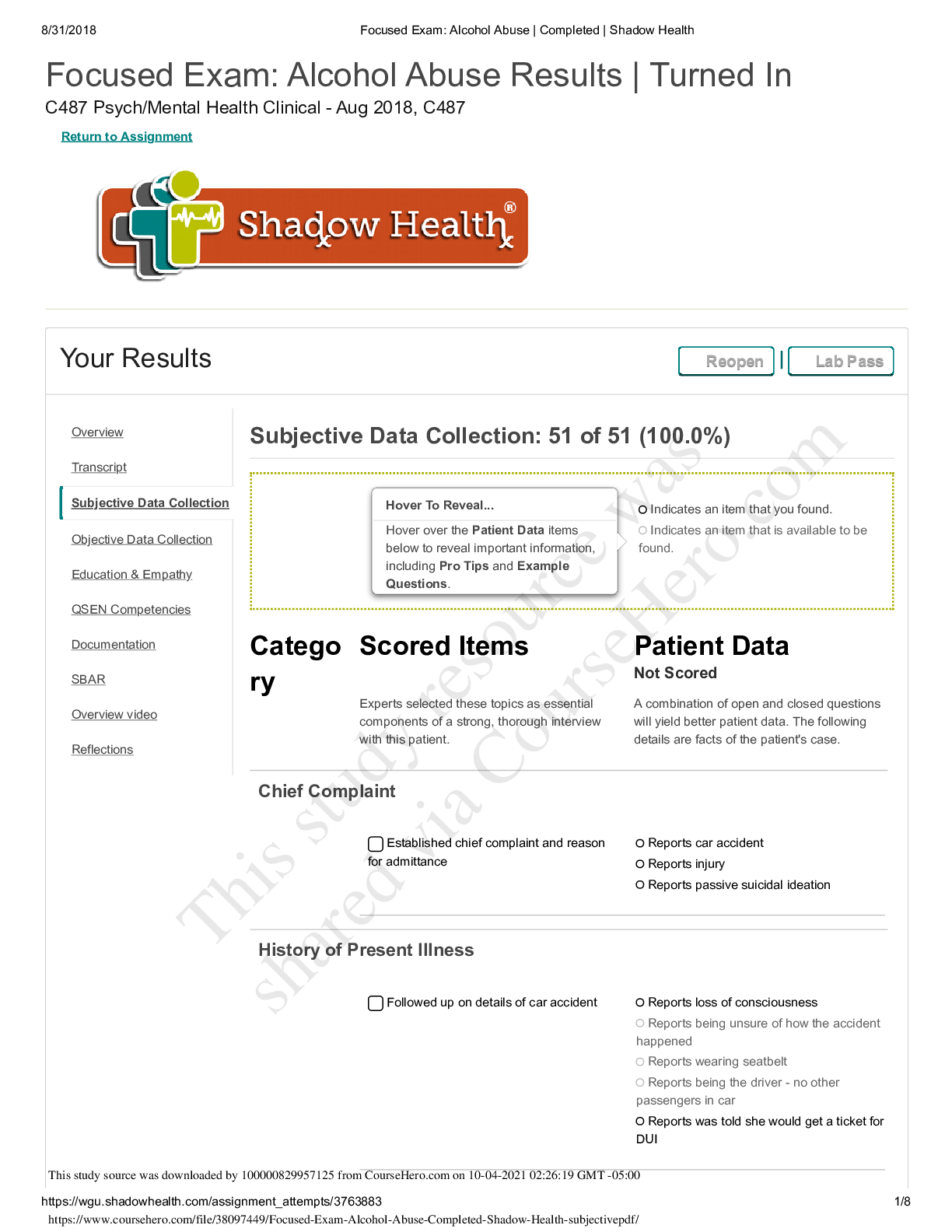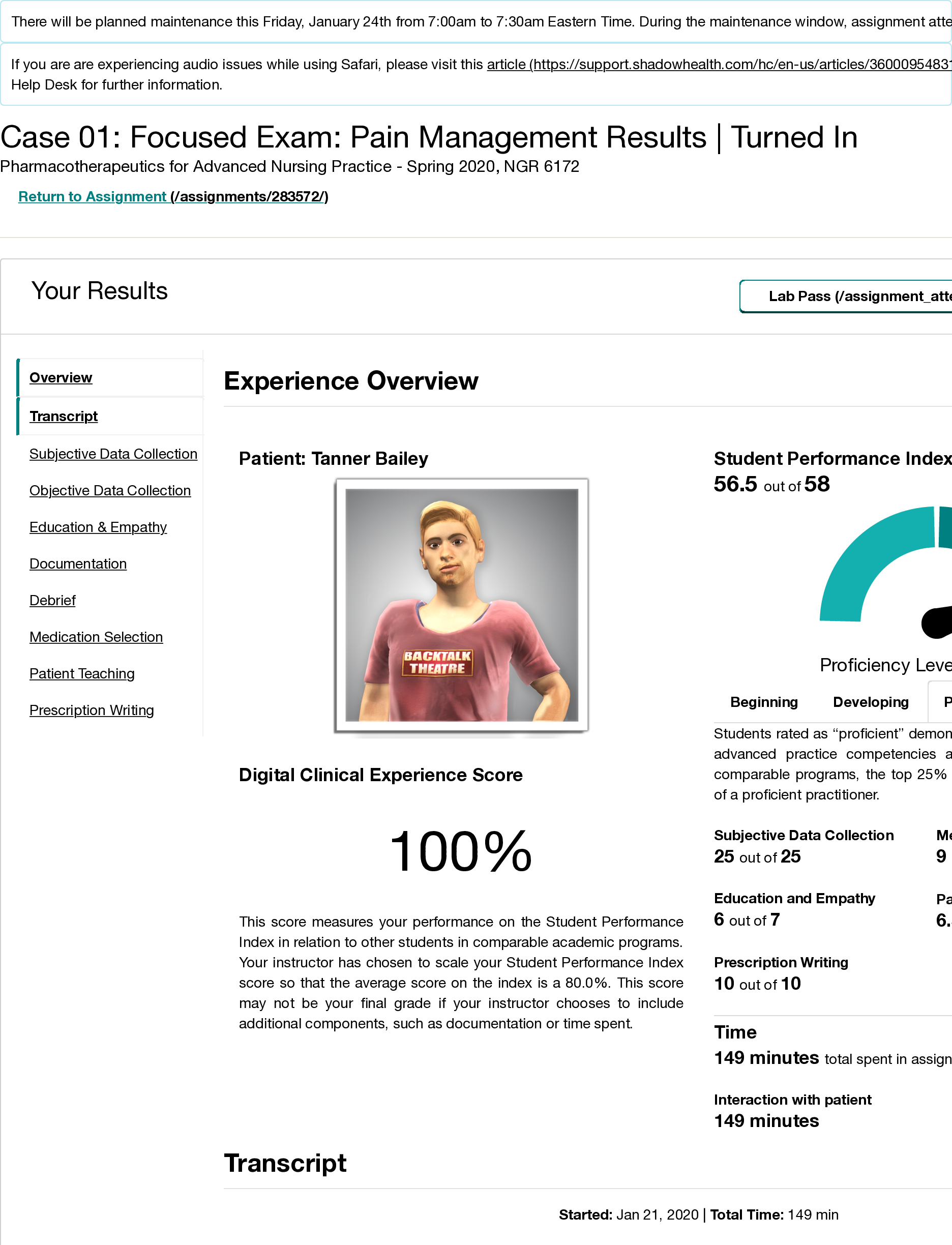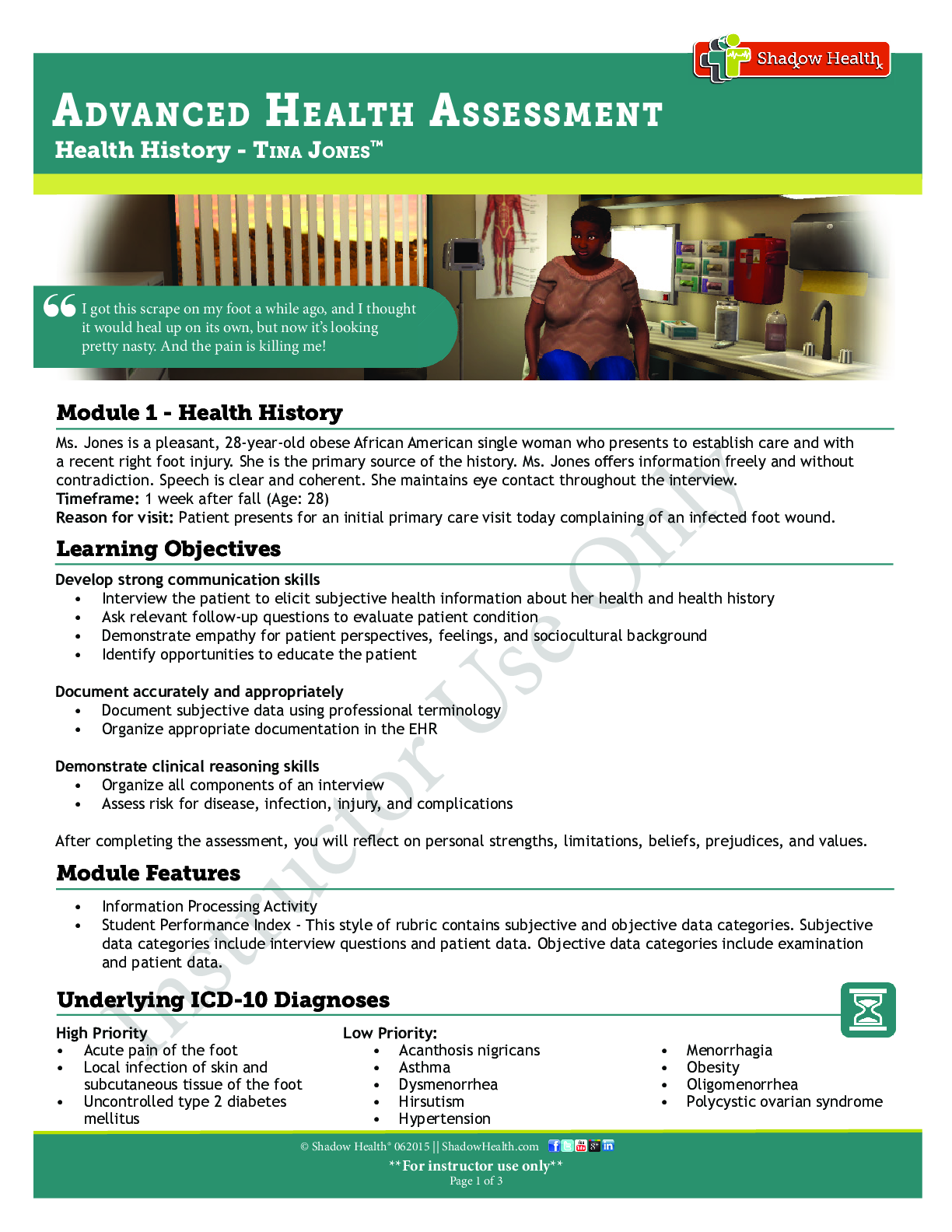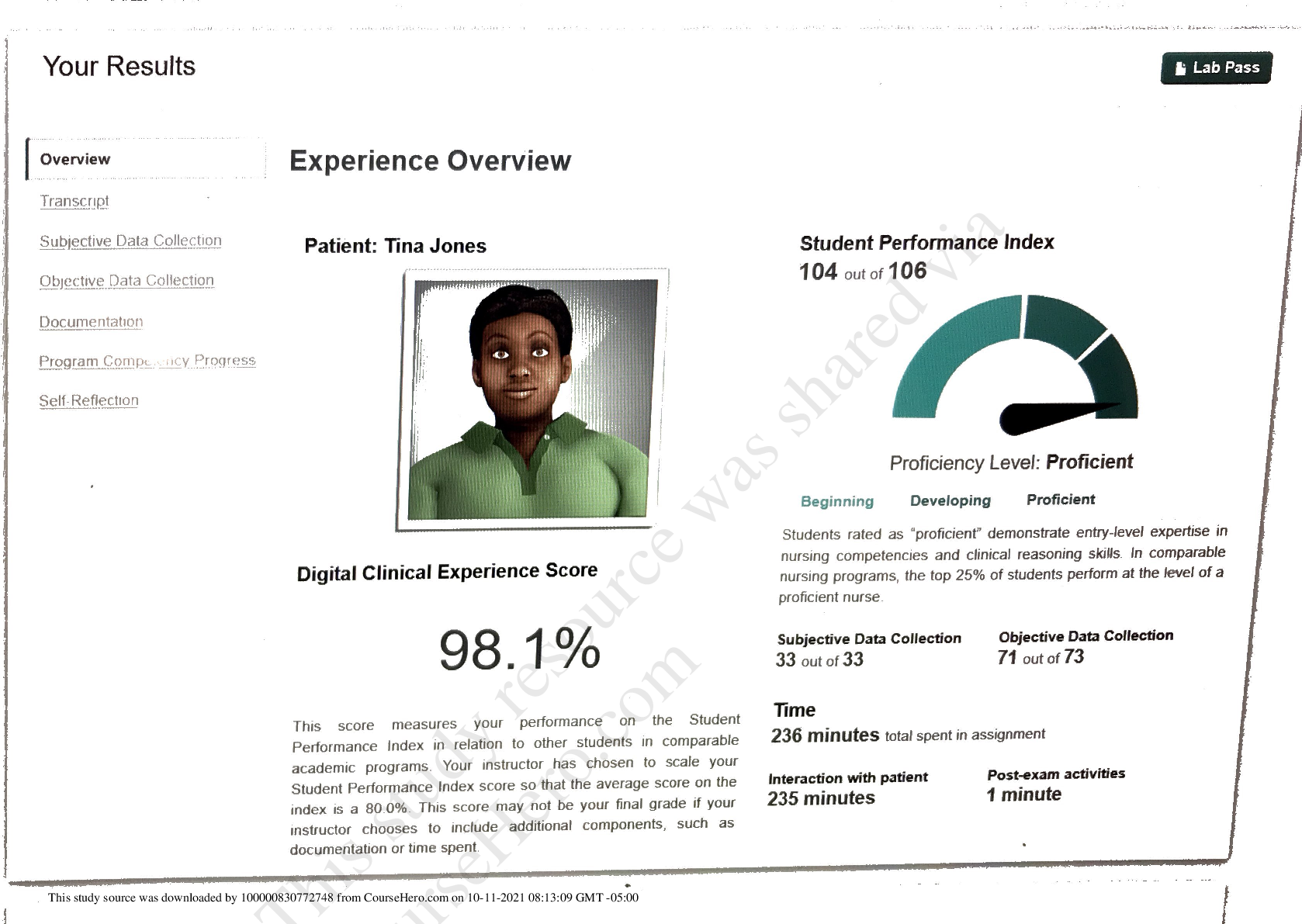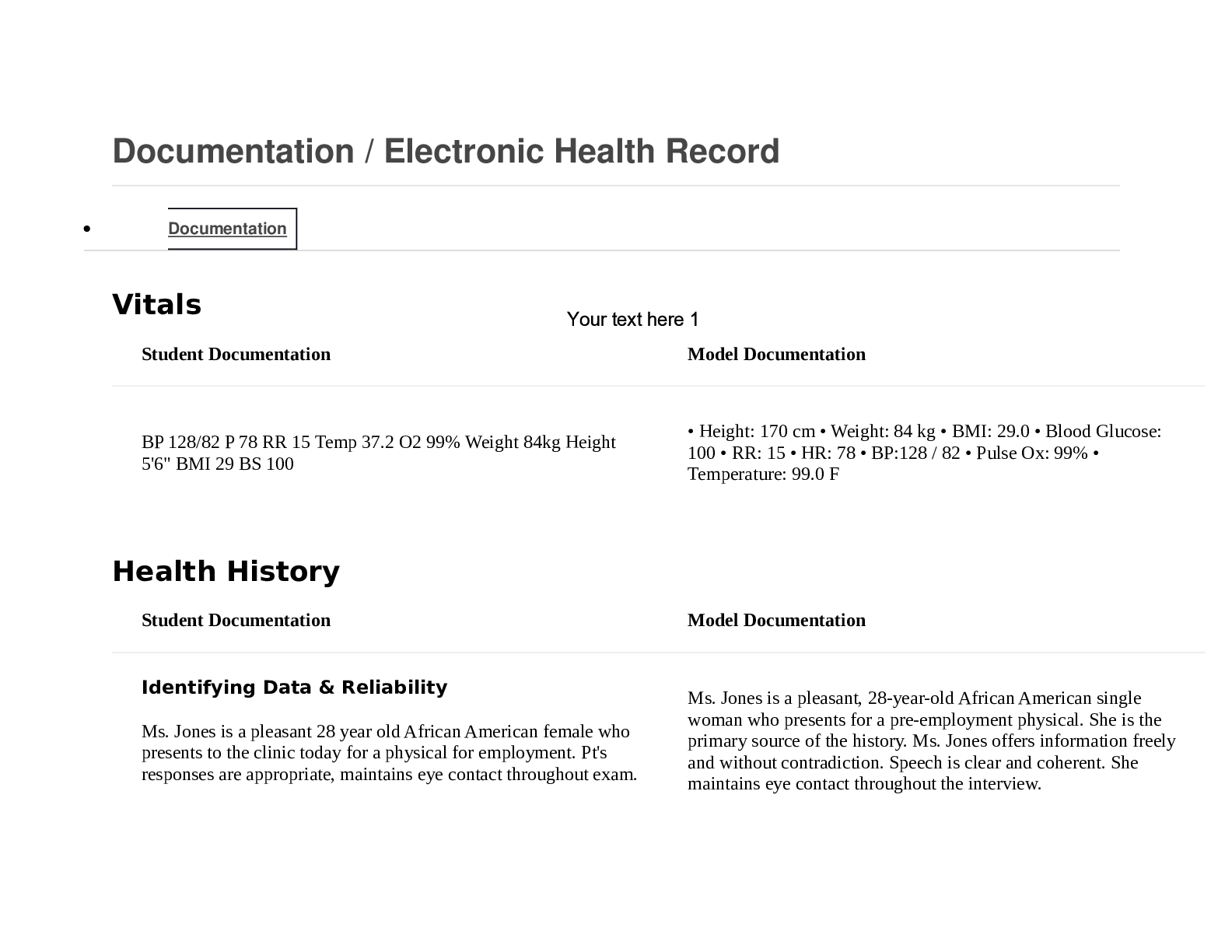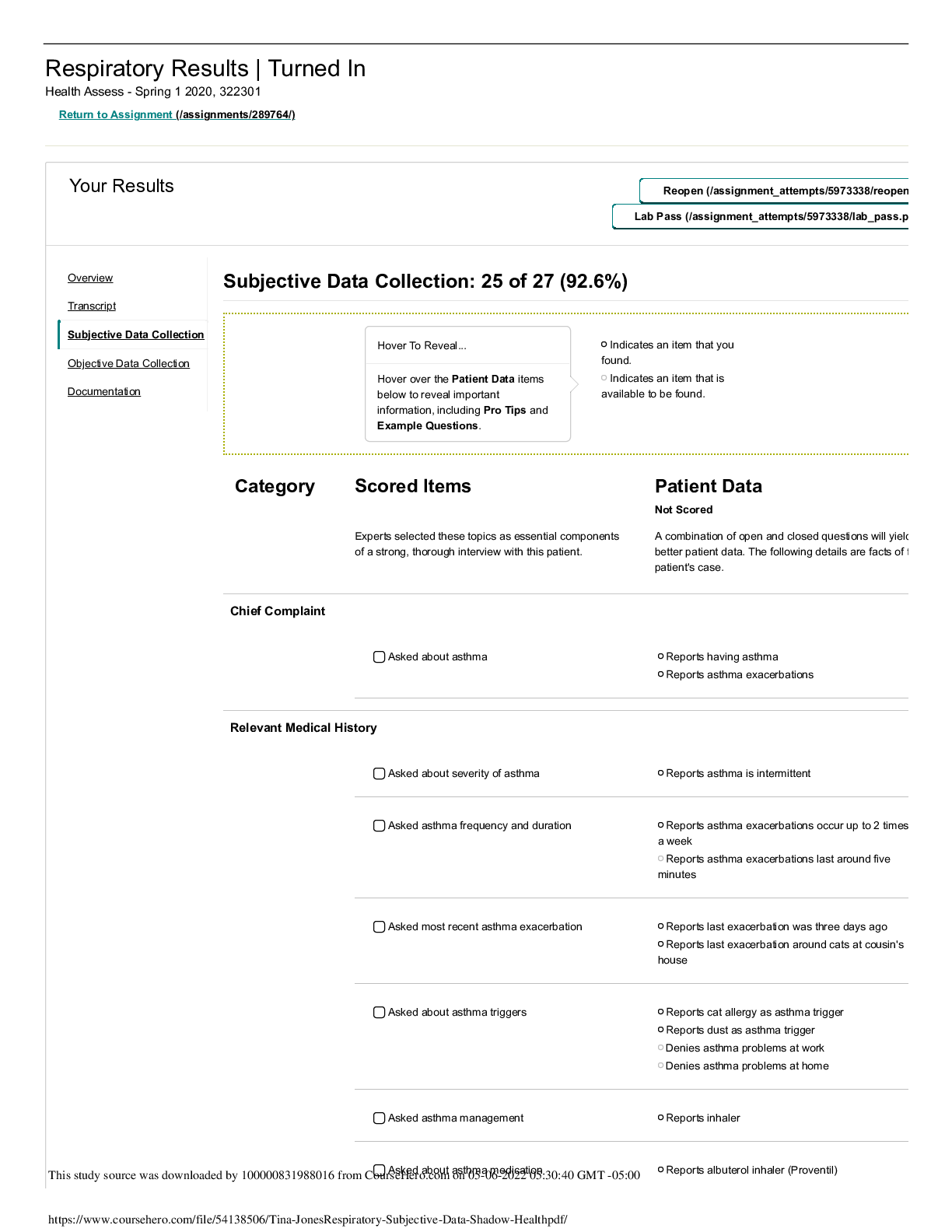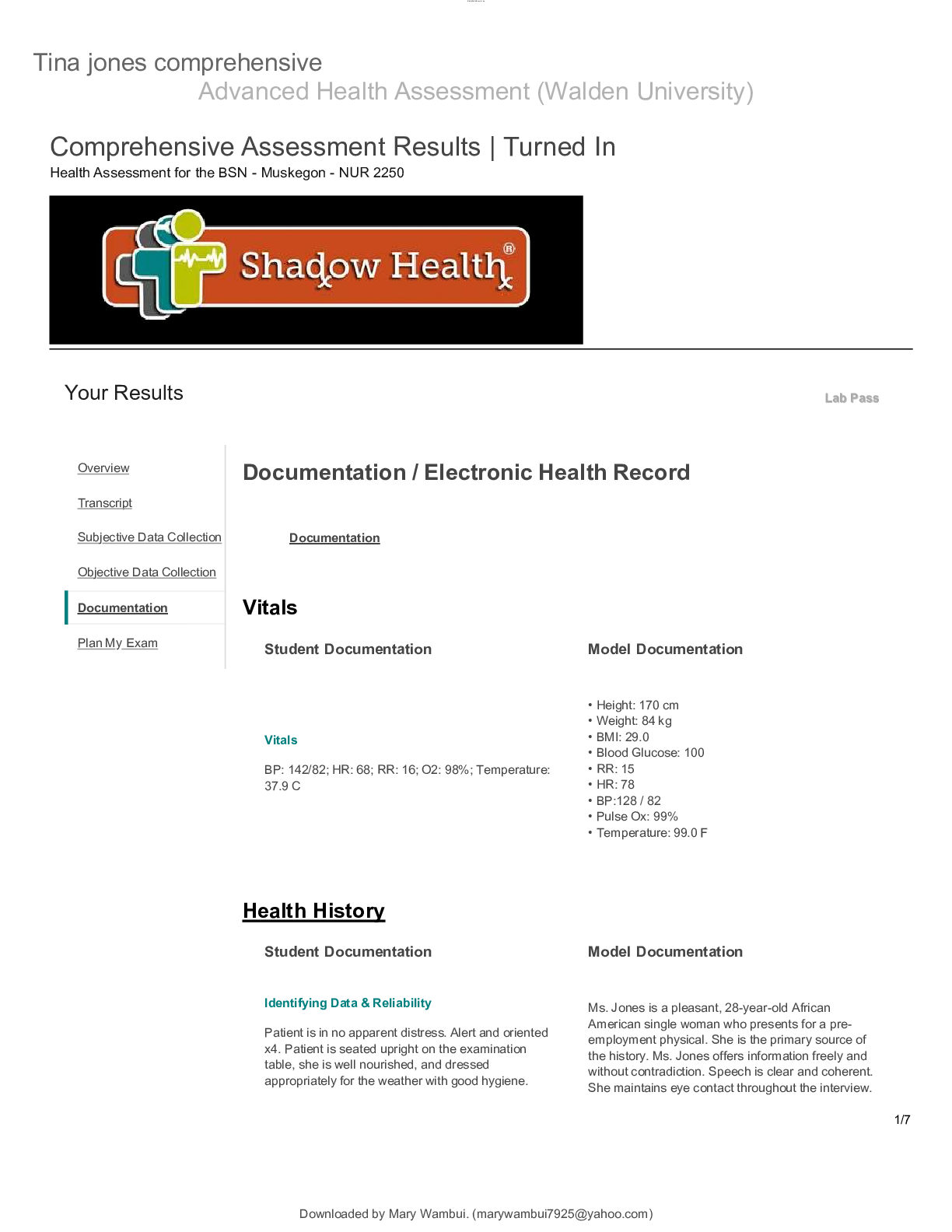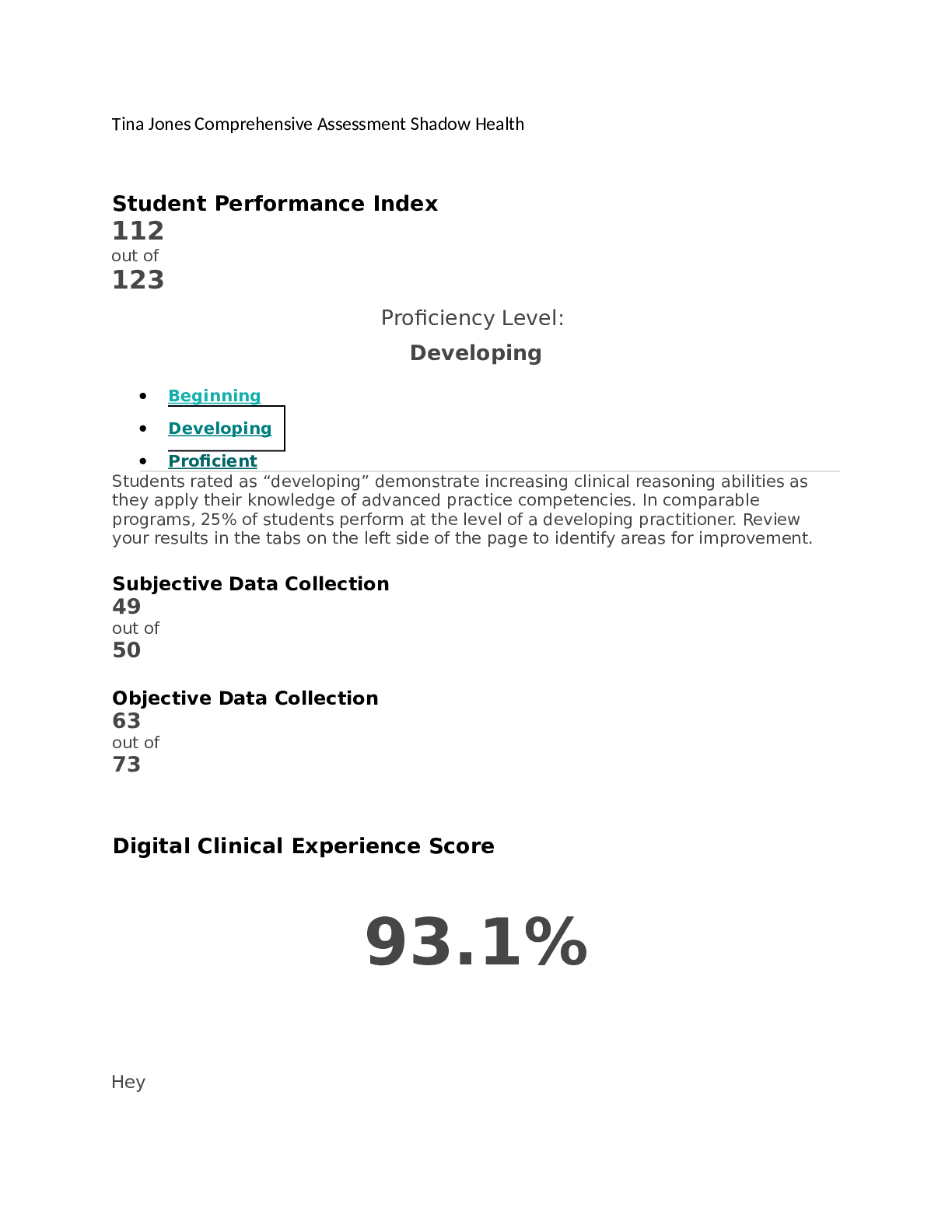*NURSING > SHADOW HEALTH > Shadow Health Abigail Harris. [DEPRESSION] (All)
Shadow Health Abigail Harris. [DEPRESSION]
Document Content and Description Below
Abigail Harris – Depression Chief Complaint Finding: Established chief complaint Finding: Reports feeling excessively weak (Found) Pro Tip: A patient's chief complaint estab... lishes any illnesses or concerns they are presenting. Asking about the chief complaint will allow the patient to voice any concerns or symptoms the patient may have. Example Question: Do you feel weak? Finding: Reports fatigue and sleepiness (Found) Pro Tip: A patient's chief complaint establishes any illnesses or concerns they are presenting. Asking about the chief complaint will allow the patient to voice any concerns or symptoms the patient may have. Example Question: Are you fatigued? History of Present Illness Finding: Asked about onset and duration of symptoms Finding: Reports symptoms have been happening for past month (Found) Finding: Reports symptoms have been increasing in the past week (Found) Pro Tip: Asking a patient about the length of their current health issues solicits information relevant to the history of their present illness. Details of their current complaint will help you follow-up on any present conditions or symptoms, such as the location of their pain or the amount of pain they may be experiencing. Example Question: Did the discomfort start gradually? Finding: Reports unable to get out of bed every morning (Found) Pro Tip: Asking a patient about the length of their current health issues solicits information relevant to the history of their present illness. Details of their current complaint will help you follow-up on any present conditions or symptoms, such as the location of their pain or the amount of pain they may be experiencing. Example Question: Can you get out of bed? Finding: Asked about frequency, duration, and timing of symptoms Finding: Reports feeling fatigued every morning (Found) Pro Tip: Asking a patient about the length of their current health issues solicits information relevant to the history of their present illness. Details of their current complaint will help you follow-up on any present conditions or symptoms, such as the location of their pain or the amount of pain they may be experiencing. Example Question: Are you tired in the morning? Finding: Reports feeling slightly more energetic in the afternoon (Found) Finding: Asked about aggravating factors of symptoms Finding: Reports feeling is worse in the morning (Found) Pro Tip: Asking a patient about the length of their current health issues solicits information relevant to the history of their present illness. Details of their current complaint will help you follow-up on any present conditions or symptoms, such as the location of their pain or the amount of pain they may be experiencing. Example Question: When do the symptoms feel worse? Finding: Reports no known triggers (Available) Pro Tip: Asking a patient about the length of their current health issues solicits information relevant to the history of their present illness. Details of their current complaint will help you follow-up on any present conditions or symptoms, such as the location of their pain or the amount of pain they may be experiencing. Example Question: What makes your symptoms worse? Finding: Asked about treatment and relieving factors of symptoms Finding: Reports that lying down feels best when fatigued (Found) Pro Tip: Asking a patient about the length of their current health issues solicits information relevant to the history of their present illness. Details of their current complaint will help you follow-up on any present conditions or symptoms, such as the location of their pain or the amount of pain they may be experiencing. Example Question: What relieves your symptoms? Depression Screening Finding: Asked about pleasure and interest in typical activities Finding: Reports loss of interest in typical activities (Found) Pro Tip: Screening a patient for the symptoms of depression can lead to recommendations for treatment and referrals. Depression can present with symptoms that affect sleep or appetite. These screenings can also uncover if a patient is at risk for self-harm. Example Question: Do you have little interest in doing things? Finding: Reports not taking pleasure in things that typically would (Found) Pro Tip: Screening a patient for the symptoms of depression can lead to recommendations for treatment and referrals. Depression can present with symptoms that affect sleep or appetite. These screenings can also uncover if a patient is at risk for self-harm. Example Question: Do you not find pleasure in things you used to like? Finding: Asked about feelings of depression Finding: Denies sadness or depression (Found) Pro Tip: Screening a patient for the symptoms of depression can lead to recommendations for treatment and referrals. Depression can present with symptoms that affect sleep or appetite. These screenings can also uncover if a patient is at risk for self-harm. Example Question: Do you feel sad or depressed? Finding: Denies feeling hopeless (Available) Finding: Asked about sleep Finding: Reports light sleep (Available) Pro Tip: Screening a patient for the symptoms of depression can lead to recommendations for treatment and referrals. Depression can present with symptoms that affect sleep or appetite. These screenings can also uncover if a patient is at risk for self-harm. Example Question: How much sleep do you get a night? Finding: Reports insomnia (Found) Pro Tip: Screening a patient for the symptoms of depression can lead to recommendations for treatment and referrals. Depression can present with symptoms that affect sleep or appetite. These screenings can also uncover if a patient is at risk for self-harm. Example Question: Have you ever had insomnia? Finding: Reports trouble falling asleep (Found) Pro Tip: Screening a patient for the symptoms of depression can lead to recommendations for treatment and referrals. Depression can present with symptoms that affect sleep or appetite. These screenings can also uncover if a patient is at risk for self-harm. Example Question: Do you have trouble falling asleep? Finding: Reports trouble staying asleep (Found) Finding: Followed up on frequency of low energy Finding: Reports feeling low energy nearly every day (Found) Pro Tip: Screening a patient for the symptoms of depression can lead to recommendations for treatment and referrals. Depression can present with symptoms that affect sleep or appetite. These screenings can also uncover if a patient is at risk for self-harm. Example Question: How often have you felt you had low energy? Finding: Asked about appetite and eating Finding: Reports loss of appetite (Found) Pro Tip: Screening a patient for the symptoms of depression can lead to recommendations for treatment and referrals. Depression can present with symptoms that affect sleep or appetite. These screenings can also uncover if a patient is at risk for self-harm. Example Question: Have you lost your appetite? Finding: Denies overeating (Available) Pro Tip: Screening a patient for the symptoms of depression can lead to recommendations for treatment and referrals. Depression can present with symptoms that affect sleep or appetite. These screenings can also uncover if a patient is at risk for self-harm. Example Question: Do you overeat? Asked about self-concept Finding: Reports feeling bad about herself (Found) Pro Tip: Screening a patient for the symptoms of depression can lead to recommendations for treatment and referrals. Depression can present with symptoms that affect sleep or appetite. These screenings can also uncover if a patient is at risk for self-harm. Example Question: Do you feel bad about yourself? Finding: Reports feeling guilty (Found) Pro Tip: Screening a patient for the symptoms of depression can lead to recommendations for treatment and referrals. Depression can present with symptoms that affect sleep or appetite. These screenings can also uncover if a patient is at risk for self-harm. Example Question: Do you ever feel guilty? Finding: Reports feeling embarrassed (Found) Pro Tip: Screening a patient for the symptoms of depression can lead to recommendations for treatment and referrals. Depression can present with symptoms that affect sleep or appetite. These screenings can also uncover if a patient is at risk for self-harm. Example Question: Have you been feeling embarrassed? Finding: Asked about changes in concentration Finding: Reports trouble concentrating (Found) Pro Tip: Screening a patient for the symptoms of depression can lead to recommendations for treatment and referrals. Depression can present with symptoms that affect sleep or appetite. These screenings can also uncover if a patient is at risk for self-harm. Finding: Asked about changes in speed with moving or speaking Finding: Denies speaking too slowly (Available) Pro Tip: Screening a patient for the symptoms of depression can lead to recommendations for treatment and referrals. Depression can present with symptoms that affect sleep or appetite. These screenings can also uncover if a patient is at risk for self-harm. Example Question: How often how often have you spoke so slowly that other people noticed? Finding: Denies speaking too quickly (Available) Pro Tip: Screening a patient for the symptoms of depression can lead to recommendations for treatment and referrals. Depression can present with symptoms that affect sleep or appetite. These screenings can also uncover if a patient is at risk for self-harm. Example Question: How often have you spoke quickly enough that other people noticed? Finding: Denies moving too slowly (Available) Pro Tip: Screening a patient for the symptoms of depression can lead to recommendations for treatment and referrals. Depression can present with symptoms that affect sleep or appetite. These screenings can also uncover if a patient is at risk for self-harm. Example Question: How often have you moved slowly enough that other people noticed Finding: Denies moving too quickly (Available) Pro Tip: Screening a patient for the symptoms of depression can lead to recommendations for treatment and referrals. Depression can present with symptoms that affect sleep or appetite. These screenings can also uncover if a patient is at risk for self-harm. Finding: Asked about suicidal ideation and self-harm Finding: Reports "it would be ok if I didn't wake up" (Found) Pro Tip: Screening a patient for the symptoms of depression can lead to recommendations for treatment and referrals. Depression can present with symptoms that affect sleep or appetite. These screenings can also uncover if a patient is at risk for self-harm. Example Question: How often have you felt like you would rather be dead? Finding: Denies wanting to hurt herself (Found) Pro Tip: Screening a patient for the symptoms of depression can lead to recommendations for treatment and referrals. Depression can present with symptoms that affect sleep or appetite. These screenings can also uncover if a patient is at risk for self-harm. Example Question: Have you ever thought about hurting yourself? Finding: Denies history of suicide attempts (Available) Pro Tip: Screening a patient for the symptoms of depression can lead to recommendations for treatment and referrals. Depression can present with symptoms that affect sleep or appetite. These screenings can also uncover if a patient is at risk for self-harm. Example Question: Have you ever attempted suicide? Past Medical History Finding: Asked about existing health conditions Finding: Reports hypothyroidism Information about the patient's existing health conditions, a timeline of diagnosis, symptoms, and allergies can indicate where you should follow-up for further care and treatment. Example Question: Are you aware of any thyroid problems? Finding: Reports type 2 diabetes (Found) Pro Tip: Inquiring into the patient's relevant history can reveal past diagnoses and previous conditions or concerns. Information about the patient's existing health conditions, a timeline of diagnosis, symptoms, and allergies can indicate where you should follow-up for further care and treatment. Example Question: Do you have diabetes? Finding: Followed up on history of mental health Finding: Reports depression diagnosis (Found) Pro Tip: Inquiring into the patient's relevant history can reveal past diagnoses and previous conditions or concerns. Information about the patient's existing health conditions, a timeline of diagnosis, symptoms, and allergies can indicate where you should follow-up for further care and treatment. Example Question: Have you experienced depression? Finding: Denies past psychiatric admissions (Available) Pro Tip: Inquiring into the patient's relevant history can reveal past diagnoses and previous conditions or concerns. Information about the patient's existing health conditions, a timeline of diagnosis, symptoms, and allergies can indicate where you should follow-up for further care and treatment. Example Question: Have you had to go to the hospital for a psychiatric disorder? Finding: Asked about allergies Finding: Denies general allergies (Found) Pro Tip: Inquiring into the patient's relevant history can reveal past diagnoses and previous conditions or concerns. Information about the patient's existing health conditions, a timeline of diagnosis, symptoms, and allergies can indicate where you should follow-up for further care and treatment. Example Question: Do you have allergies? Finding: Denies environmental allergies (Available) Pro Tip: Inquiring into the patient's relevant history can reveal past diagnoses and previous conditions or concerns. Information about the patient's existing health conditions, a timeline of diagnosis, symptoms, and allergies can indicate where you should follow-up for further care and treatment. Example Question: Do you have environmental allergies? Finding: Denies latex allergy (Available) Pro Tip: Inquiring into the patient's relevant history can reveal past diagnoses and previous conditions or concerns. Information about the patient's existing health conditions, a timeline of diagnosis, symptoms, and allergies can indicate where you should follow-up for further care and treatment. Example Question: Do you have a latex allergy? Finding: Denies food allergies (Available) Pro Tip: Inquiring into the patient's relevant history can reveal past diagnoses and previous conditions or concerns. Information about the patient's existing health conditions, a timeline of diagnosis, symptoms, and allergies can indicate where you should follow-up for further care and treatment. Example Question: Do you have food allergies? Finding: Asked specifically about medication allergies Finding: Denies medication allergies (Found) Pro Tip: Inquiring into the patient's relevant history can reveal past diagnoses and previous conditions or concerns. Information about the patient's existing health conditions, a timeline of diagnosis, symptoms, and allergies can indicate where you should follow-up for further care and treatment. Example Question: Do you have medication allergies? Home Medications Finding: Asked about home medications Finding: Reports medications for diabetes (Found) Pro Tip: A patient's home medications can provide insight into the patient's current treatment and its effacacy. Inquiring into medication history, dosage, and frequency will help you understand the patient's background and how it may affect their current situation. Example Question: Have you been taking medication for your diabetes? Finding: Reports medications for depression (Found) Pro Tip: A patient's home medications can provide insight into the patient's current treatment and its effacacy. Inquiring into medication history, dosage, and frequency will help you understand the patient's background and how it may affect their current situation. Example Question: Do you take medication for depression? Finding: Reports medications for sleep (Found) Pro Tip: A patient's home medications can provide insight into the patient's current treatment and its effacacy. Inquiring into medication history, dosage, and frequency will help you understand the patient's background and how it may affect their current situation. Example Question: Finding: Reports medication for thyroid (Found) Pro Tip: A patient's home medications can provide insight into the patient's current treatment and its effacacy. Inquiring into medication history, dosage, and frequency will help you understand the patient's background and how it may affect their current situation. Example Question: Are you on any thyroid medications? Finding: Denies taking vitamins (Available) Pro Tip: A patient's home medications can provide insight into the patient's current treatment and its effacacy. Inquiring into medication history, dosage, and frequency will help you understand the patient's background and how it may affect their current situation. Example Question: Do you take vitamins? Finding: Denies taking herbal supplements (Available) Pro Tip: A patient's home medications can provide insight into the patient's current treatment and its effacacy. Inquiring into medication history, dosage, and frequency will help you understand the patient's background and how it may affect their current situation. Example Question: Do you take supplements? Finding: Asked about medication regimen adherence Finding: Reports using a pillbox to organize medications (Available) Pro Tip: A patient's home medications can provide insight into the patient's current treatment and its effacacy. Inquiring into medication history, dosage, and frequency will help you understand the patient's background and how it may affect their current situation. Example Question: Finding: Reports that her son helps her remember medications (Found) Pro Tip: A patient's home medications can provide insight into the patient's current treatment and its effacacy. Inquiring into medication history, dosage, and frequency will help you understand the patient's background and how it may affect their current situation. Example Question: How do you manage your medication? Finding: Denies missing doses of medication (Found) Pro Tip: A patient's home medications can provide insight into the patient's current treatment and its effacacy. Inquiring into medication history, dosage, and frequency will help you understand the patient's background and how it may affect their current situation. Example Question: Do you miss doses of your medication? Finding: Denies missing doses of medication because of side effects (Available) Pro Tip: A patient's home medications can provide insight into the patient's current treatment and its effacacy. Inquiring into medication history, dosage, and frequency will help you understand the patient's background and how it may affect their current situation. Example Question: Did side effects cause you to skip your medication? Finding: Denies difficulty obtaining medications because of finances (Available) Pro Tip: A patient's home medications can provide insight into the patient's current treatment and its effacacy. Inquiring into medication history, dosage, and frequency will help you understand the patient's background and how it may affect their current situation. Example Question: Do you have enough money to afford your prescriptions? Finding: Do you have difficulty obtaining medication because of transportation? Finding: Followed up on last dose of home medications Finding: Reports receiving insulin injection this morning (Found) Pro Tip: A patient's home medications can provide insight into the patient's current treatment and its effacacy. Inquiring into medication history, dosage, and frequency will help you understand the patient's background and how it may affect their current situation. Example Question: Did you take your diabetes medication today? Finding: Reports taking medication for thyroid this morning (Found) Pro Tip: A patient's home medications can provide insight into the patient's current treatment and its effacacy. Inquiring into medication history, dosage, and frequency will help you understand the patient's background and how it may affect their current situation. Example Question: When was the last time you took any medications? Finding: Denies taking any other medications today (Found) Pro Tip: A patient's home medications can provide insight into the patient's current treatment and its effacacy. Inquiring into medication history, dosage, and frequency will help you understand the patient's background and how it may affect their current situation. Example Question: When was the last time you took any medications? Finding: Did you take your medication yesterday? Finding: Followed up on medications for diabetes Finding: Reports taking two types of insulin (Found) Pro Tip: A patient's home medications can provide insight into the patient's current treatment and its effacacy. Inquiring into medication history, dosage, and frequency will help you understand the patient's background and how it may affect their current situation. Example Question: What kind of insulin do you take? Finding: Reports both insulin types are subcutaneous (Available) Pro Tip: A patient's home medications can provide insight into the patient's current treatment and its effacacy. Inquiring into medication history, dosage, and frequency will help you understand the patient's background and how it may affect their current situation. Example Question: What form is the insulin? Finding: Reports taking one form of insulin at mealtimes (Available) Pro Tip: A patient's home medications can provide insight into the patient's current treatment and its effacacy. Inquiring into medication history, dosage, and frequency will help you understand the patient's background and how it may affect their current situation. Example Question: How often do you take insulin? Finding: How often do you take insulin? Finding: Reports that her son administers insulin injections (Available) Pro Tip: A patient's home medications can provide insight into the patient's current treatment and its effacacy. Inquiring into medication history, dosage, and frequency will help you understand the patient's background and how it may affect their current situation. Example Question: Do you have someone who helps you with your insulin shots? Finding: Denies remembering the specific types of insulin she takes (Available) Pro Tip: A patient's home medications can provide insight into the patient's current treatment and its effacacy. Inquiring into medication history, dosage, and frequency will help you understand the patient's background and how it may affect their current situation. Example Question: What kind of insulin do you take? Finding: Denies remembering the dose or units of insulin (Available) Pro Tip: A patient's home medications can provide insight into the patient's current treatment and its effacacy. Inquiring into medication history, dosage, and frequency will help you understand the patient's background and how it may affect their current situation. Example Question: What dosage of insulin do you take? Finding: Followed up on medication for sleep Finding: What have you been taking to help you sleep? Finding: Denies knowing dosage of sleep medication (Available) Pro Tip: A patient's home medications can provide insight into the patient's current treatment and its effacacy. Inquiring into medication history, dosage, and frequency will help you understand the patient's background and how it may affect their current situation. Example Question: What dosage of sleep medication do you take? Finding: Reports taking sleep medication a few times a week (Available) Pro Tip: A patient's home medications can provide insight into the patient's current treatment and its effacacy. Inquiring into medication history, dosage, and frequency will help you understand the patient's background and how it may affect their current situation. Example Question: How often do you take sleep medication? Finding: Reports taking sleep medication before bed (Available) Pro Tip: A patient's home medications can provide insight into the patient's current treatment and its effacacy. Inquiring into medication history, dosage, and frequency will help you understand the patient's background and how it may affect their current situation. Example Question: When did you last take sleep medication? Finding: Followed up on medication for depression Finding: What depression medication do you take? Finding: Denies remembering dosage of Effexor (Available) Pro Tip: A patient's home medications can provide insight into the patient's current treatment and its effacacy. Inquiring into medication history, dosage, and frequency will help you understand the patient's background and how it may affect their current situation. Example Question: What dose of effexor do you take? Finding: Reports taking Effexor daily (Available) Pro Tip: A patient's home medications can provide insight into the patient's current treatment and its effacacy. Inquiring into medication history, dosage, and frequency will help you understand the patient's background and how it may affect their current situation. Example Question: How often do you take effexor? Finding: Followed up on medication for thyroid Finding: Denies knowing name of thyroid medication (Found) Pro Tip: A patient's home medications can provide insight into the patient's current treatment and its effacacy. Inquiring into medication history, dosage, and frequency will help you understand the patient's background and how it may affect their current situation. Example Question: What medication do you take for your thyroid? Finding: How much thyroid medication do you take? Finding: Reports taking thyroid medication daily (Available) Pro Tip: A patient's home medications can provide insight into the patient's current treatment and its effacacy. Inquiring into medication history, dosage, and frequency will help you understand the patient's background and how it may affect their current situation. Example Question: How often do you take thyroid medication? Social History Finding: Asked about family, support system, and living situation Finding: Reports being widowed (Available) Pro Tip: A patient's social history encompasses their family and support system, living situation, and daily behaviors such as diet, exercise, sexual activity, and substance use. These factors can influence their current health and wellness. Asking about a patient's social history can also unveil the influence of their present illnesses in their social lives. Example Question: Are you married? Finding: Reports living with son and his family (Found) Pro Tip: A patient's social history encompasses their family and support system, living situation, and daily behaviors such as diet, exercise, sexual activity, and substance use. These factors can influence their current health and wellness. Asking about a patient's social history can also unveil the influence of their present illnesses in their social lives. Example Question: How is your living situation? Reports that she likes living with son and family (Found) Pro Tip: A patient's social history encompasses their family and support system, living situation, and daily behaviors such as diet, exercise, sexual activity, and substance use. These factors can influence their current health and wellness. Asking about a patient's social history can also unveil the influence of their present illnesses in their social lives. Example Question: How is your living situation? Finding: Asked about activity level Finding: Reports being retired (Available) Pro Tip: A patient's social history encompasses their family and support system, living situation, and daily behaviors such as diet, exercise, sexual activity, and substance use. These factors can influence their current health and wellness. Asking about a patient's social history can also unveil the influence of their present illnesses in their social lives. Example Question: Are you currently working? Finding: Reports being less active recently (Found) Pro Tip: A patient's social history encompasses their family and support system, living situation, and daily behaviors such as diet, exercise, sexual activity, and substance use. These factors can influence their current health and wellness. Asking about a patient's social history can also unveil the influence of their present illnesses in their social lives. Example Question: Has your ability to tolerate activity changed? Finding: Reports decreased interest in taking walks (Available) Pro Tip: A patient's social history encompasses their family and support system, living situation, and daily behaviors such as diet, exercise, sexual activity, and substance use. These factors can influence their current health and wellness. Asking about a patient's social history can also unveil the influence of their present illnesses in their social lives. Example Question: Does a specific activity make you tired? Asked about substance use Finding: Reports alcohol use (Found) Pro Tip: A patient's social history encompasses their family and support system, living situation, and daily behaviors such as diet, exercise, sexual activity, and substance use. These factors can influence their current health and wellness. Asking about a patient's social history can also unveil the influence of their present illnesses in their social lives. Example Question: Do you drink alcohol? Finding: Denies illicit drug use (Found) Pro Tip: A patient's social history encompasses their family and support system, living situation, and daily behaviors such as diet, exercise, sexual activity, and substance use. These factors can influence their current health and wellness. Asking about a patient's social history can also unveil the influence of their present illnesses in their social lives. Example Question: Do you do illegal drugs? Finding: Denies use of tobacco and nicotine products (Found) Pro Tip: A patient's social history encompasses their family and support system, living situation, and daily behaviors such as diet, exercise, sexual activity, and substance use. These factors can influence their current health and wellness. Asking about a patient's social history can also unveil the influence of their present illnesses in their social lives. Example Question: Do you use tobacco? Finding: Followed up about alcohol use Finding: Reports occasional alcohol use (Found) Pro Tip: A patient's social history encompasses their family and support system, living situation, and daily behaviors such as diet, exercise, sexual activity, and substance use. These factors can influence their current health and wellness. Asking about a patient's social history can also unveil the influence of their present illnesses in their social lives. Example Question: Do you drink frequently? Finding: Drinks wine less than 1 glass / month (Available) Pro Tip: A patient's social history encompasses their family and support system, living situation, and daily behaviors such as diet, exercise, sexual activity, and substance use. These factors can influence their current health and wellness. Asking about a patient's social history can also unveil the influence of their present illnesses in their social lives. Example Question: How often do you drink alcohol? Review of Systems Finding: Asked about general symptoms Finding: Denies fever (Available) Pro Tip: Understanding a patient's health involves a comprehensive overview of their physiological systems. This is necessary to understand what symptoms may indicate larger issues, and what treatments the patient may require. Example Question: Do you have a fever? Finding: Denies chills (Available) Pro Tip: Understanding a patient's health involves a comprehensive overview of their physiological systems. This is necessary to understand what symptoms may indicate larger issues, and what treatments the patient may require. Example Question: Do you get chills? Finding: Denies night sweats (Available) Pro Tip: Understanding a patient's health involves a comprehensive overview of their physiological systems. This is necessary to understand what symptoms may indicate larger issues, and what treatments the patient may require. Example Question: Finding: Reports weight loss (Found) Pro Tip: Understanding a patient's health involves a comprehensive overview of their physiological systems. This is necessary to understand what symptoms may indicate larger issues, and what treatments the patient may require. Example Question: Have you lost weight? Finding: Followed up on weight loss Finding: Weight loss was 9 lbs (Found) Pro Tip: Understanding a patient's health involves a comprehensive overview of their physiological systems. This is necessary to understand what symptoms may indicate larger issues, and what treatments the patient may require. Example Question: How much weight have you lost? Finding: Weight loss occurred in the past month (Found) Pro Tip: Understanding a patient's health involves a comprehensive overview of their physiological systems. This is necessary to understand what symptoms may indicate larger issues, and what treatments the patient may require. Example Question: When was your weight change? Finding: Weight loss was unintentional (Found) Pro Tip: Understanding a patient's health involves a comprehensive overview of their physiological systems. This is necessary to understand what symptoms may indicate larger issues, and what treatments the patient may require. Example Question: Did you do anything to lose the weight? Finding: Finding: Reports presbycusis (age-related hearing loss) (Available) Pro Tip: Understanding a patient's health involves a comprehensive overview of their physiological systems. This is necessary to understand what symptoms may indicate larger issues, and what treatments the patient may require. Example Question: Do you have problems with your hearing? Finding: Reports presbyopia (farsightedness caused by loss of elasticity of the eye lens) (Found) Pro Tip: Understanding a patient's health involves a comprehensive overview of their physiological systems. This is necessary to understand what symptoms may indicate larger issues, and what treatments the patient may require. Example Question: Do you have problems with your eyesight? Finding: Wears glasses for reading (Found) Pro Tip: Understanding a patient's health involves a comprehensive overview of their physiological systems. This is necessary to understand what symptoms may indicate larger issues, and what treatments the patient may require. Example Question: Do you wear glasses? Finding: Asked about review of systems for respiratory Finding: Denies cough (Available) Pro Tip: Understanding a patient's health involves a comprehensive overview of their physiological systems. This is necessary to understand what symptoms may indicate larger issues, and what treatments the patient may require. Example Question: Do you have a cough? Finding: (Found) Pro Tip: Understanding a patient's health involves a comprehensive overview of their physiological systems. This is necessary to understand what symptoms may indicate larger issues, and what treatments the patient may require. Example Question: Does activity ever make you short of breath? Finding: Denies wheezing (Available) Pro Tip: Understanding a patient's health involves a comprehensive overview of their physiological systems. This is necessary to understand what symptoms may indicate larger issues, and what treatments the patient may require. Example Question: Any recent wheezing? Finding: Asked about review of systems for cardiovascular Finding: Denies chest pain (Available) Pro Tip: Understanding a patient's health involves a comprehensive overview of their physiological systems. This is necessary to understand what symptoms may indicate larger issues, and what treatments the patient may require. Example Question: Do you have chest pain? Finding: Denies palpitations (Available) Pro Tip: Understanding a patient's health involves a comprehensive overview of their physiological systems. This is necessary to understand what symptoms may indicate larger issues, and what treatments the patient may require. Example Question: Do you have heart palpitations? Finding: Denies edema (Available) Pro Tip: Understanding a patient's health involves a comprehensive overview of their physiological systems. This is necessary to understand what symptoms may indicate larger issues, and what treatments the patient may require. Example Question: Have you noticed swelling anywhere? Finding: Denies claudication (Available) Pro Tip: Understanding a patient's health involves a comprehensive overview of their physiological systems. This is necessary to understand what symptoms may indicate larger issues, and what treatments the patient may require. Example Question: Do you get cramps? Finding: Asked about review of systems for skin, hair, and nails Finding: Denies changes in hair (Found) Pro Tip: Understanding a patient's health involves a comprehensive overview of their physiological systems. This is necessary to understand what symptoms may indicate larger issues, and what treatments the patient may require. Example Question: Do you have problems with your hair? Finding: Denies changes in skin (Found) Pro Tip: Understanding a patient's health involves a comprehensive overview of their physiological systems. This is necessary to understand what symptoms may indicate larger issues, and what treatments the patient may require. Example Question: Do you have skin problems? Finding: Reports changes in nail - brittle and easily broken (Available) Pro Tip: Understanding a patient's health involves a comprehensive overview of their physiological systems. This is necessary to understand what symptoms may indicate larger issues, and what treatments the patient may require. Example Question: Do you have problems with your fingernails? Finding: Denies pruritus (Available) Pro Tip: Understanding a patient's health involves a comprehensive overview of their physiological systems. This is necessary to understand what symptoms may indicate larger issues, and what treatments the patient may require. Example Question: Are you itchy? Finding: Denies easy bruising (Available) Pro Tip: Understanding a patient's health involves a comprehensive overview of their physiological systems. This is necessary to understand what symptoms may indicate larger issues, and what treatments the patient may require. Example Question: Do you feel you bruise easy? Finding: Denies pigmentation changes (Available) Pro Tip: Understanding a patient's health involves a comprehensive overview of their physiological systems. This is necessary to understand what symptoms may indicate larger issues, and what treatments the patient may require. Example Question: Has your skin changed color? Finding: Asked about review of systems for gastrointestinal Finding: Reports nausea (Found) Pro Tip: Understanding a patient's health involves a comprehensive overview of their physiological systems. This is necessary to understand what symptoms may indicate larger issues, and what treatments the patient may require. Example Question: Have you been nauseated? Finding: Denies abdominal pain (Available) Pro Tip: Understanding a patient's health involves a comprehensive overview of their physiological systems. This is necessary to understand what symptoms may indicate larger issues, and what treatments the patient may require. Example Question: Do you currently have abdominal pain? Finding: Denies difficulty swallowing (Available) Pro Tip: Understanding a patient's health involves a comprehensive overview of their physiological systems. This is necessary to understand what symptoms may indicate larger issues, and what treatments the patient may require. Example Question: Have you had trouble swallowing? Finding: Denies vomiting (Available) Pro Tip: Understanding a patient's health involves a comprehensive overview of their physiological systems. This is necessary to understand what symptoms may indicate larger issues, and what treatments the patient may require. Example Question: Have you been vomiting lately? Finding: Reports constipation (Found) Pro Tip: Understanding a patient's health involves a comprehensive overview of their physiological systems. This is necessary to understand what symptoms may indicate larger issues, and what treatments the patient may require. Example Question: Are you feeling constipated? Finding: Denies diarrhea (Available) Pro Tip: Understanding a patient's health involves a comprehensive overview of their physiological systems. This is necessary to understand what symptoms may indicate larger issues, and what treatments the patient may require. Example Question: Do you have diarrhea? Finding: Followed up on constipation Finding: Reports occasional constipation for past month, "maybe longer" (Available) Pro Tip: Understanding a patient's health involves a comprehensive overview of their physiological systems. This is necessary to understand what symptoms may indicate larger issues, and what treatments the patient may require. Example Question: How long have you had problems with constipation? Finding: Denies taking medication to treat constipation (Found) Pro Tip: Understanding a patient's health involves a comprehensive overview of their physiological systems. This is necessary to understand what symptoms may indicate larger issues, and what treatments the patient may require. Example Question: Have you tried anything to treat the constipation? Finding: Bowel movements are every 2 - 3 days (Available) Pro Tip: Understanding a patient's health involves a comprehensive overview of their physiological systems. This is necessary to understand what symptoms may indicate larger issues, and what treatments the patient may require. Example Question: How long have you had problems with constipation? Finding: Reports occasionally needing to strain to pass bowel movement (Available) Pro Tip: Understanding a patient's health involves a comprehensive overview of their physiological systems. This is necessary to understand what symptoms may indicate larger issues, and what treatments the patient may require. Example Question: Can you tell me about your constipation? Finding: Reports stool is typically hard (Available) Pro Tip: Understanding a patient's health involves a comprehensive overview of their physiological systems. This is necessary to understand what symptoms may indicate larger issues, and what treatments the patient may require. Example Question: Have you had any stool changes? Finding: Reports stool is typically dark brown (Available) Pro Tip: Understanding a patient's health involves a comprehensive overview of their physiological systems. This is necessary to understand what symptoms may indicate larger issues, and what treatments the patient may require. Example Question: Have you had any stool changes? Finding: Asked about review of systems for musculoskeletal Finding: Denies recent injury (Available) Pro Tip: Understanding a patient's health involves a comprehensive overview of their physiological systems. This is necessary to understand what symptoms may indicate larger issues, and what treatments the patient may require. Example Question: Did you injury your body anywhere? Finding: Reports joint pain (Found) Pro Tip: Understanding a patient's health involves a comprehensive overview of their physiological systems. This is necessary to understand what symptoms may indicate larger issues, and what treatments the patient may require. Example Question: Do you have joint pain? Finding: Denies erythema (Available) Pro Tip: Understanding a patient's health involves a comprehensive overview of their physiological systems. This is necessary to understand what symptoms may indicate larger issues, and what treatments the patient may require. Example Question: Do you have unusual redness anywhere? Finding: Denies edema of joints (Available) Pro Tip: Understanding a patient's health involves a comprehensive overview of their physiological systems. This is necessary to understand what symptoms may indicate larger issues, and what treatments the patient may require. Example Question: Do you have swollen joints? Finding: Followed up on joint pain Finding: Reports joint pain is aching (Found) Pro Tip: Understanding a patient's health involves a comprehensive overview of their physiological systems. This is necessary to understand what symptoms may indicate larger issues, and what treatments the patient may require. Example Question: Describe the pain you feel within your joints? Finding: Reports joint pain has increased past 2 weeks (Found) Pro Tip: Understanding a patient's health involves a comprehensive overview of their physiological systems. This is necessary to understand what symptoms may indicate larger issues, and what treatments the patient may require. Example Question: How long have you been having joint pain for? Finding: Denies taking medication to treat joint pain (Found) Pro Tip: Understanding a patient's health involves a comprehensive overview of their physiological systems. This is necessary to understand what symptoms may indicate larger issues, and what treatments the patient may require. Example Question: How long have you been having joint pain for? Finding: Denies changes in coordination (Available) Pro Tip: Understanding a patient's health involves a comprehensive overview of their physiological systems. This is necessary to understand what symptoms may indicate larger issues, and what treatments the patient may require. Example Question: How is your coordination? Finding: Denies frequent headaches (Available) Pro Tip: Understanding a patient's health involves a comprehensive overview of their physiological systems. This is necessary to understand what symptoms may indicate larger issues, and what treatments the patient may require. Example Question: Do you get unusually frequent headaches? Finding: Reports dizziness (Found) Pro Tip: Understanding a patient's health involves a comprehensive overview of their physiological systems. This is necessary to understand what symptoms may indicate larger issues, and what treatments the patient may require. Example Question: Do you have neurological problems? Finding: Followed up on dizziness Finding: Reports dizziness upon waking (Found) Pro Tip: Understanding a patient's health involves a comprehensive overview of their physiological systems. This is necessary to understand what symptoms may indicate larger issues, and what treatments the patient may require. Example Question: Are you dizzy right now? [Show More]
Last updated: 1 year ago
Preview 1 out of 34 pages
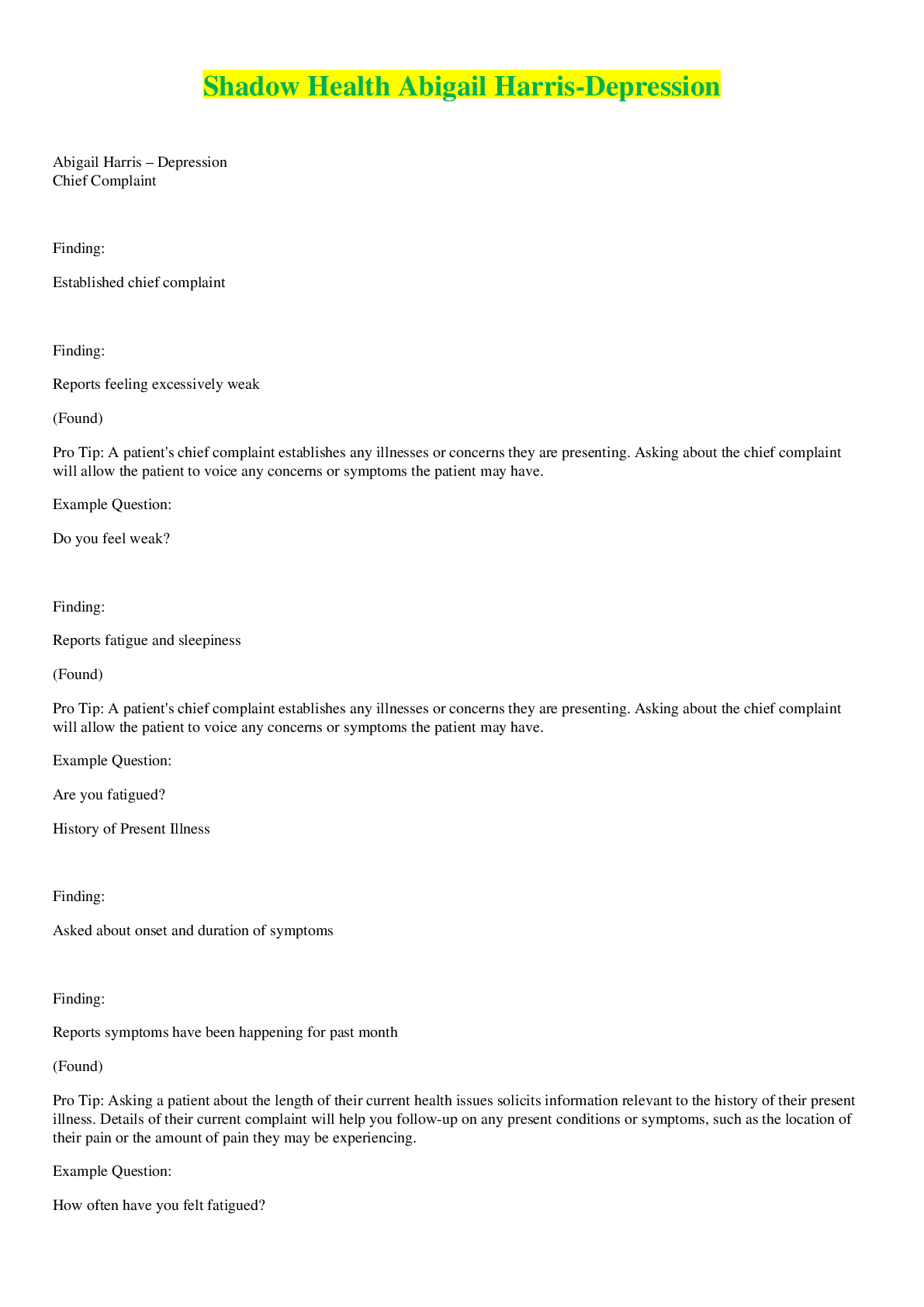
Also available in bundle (1)
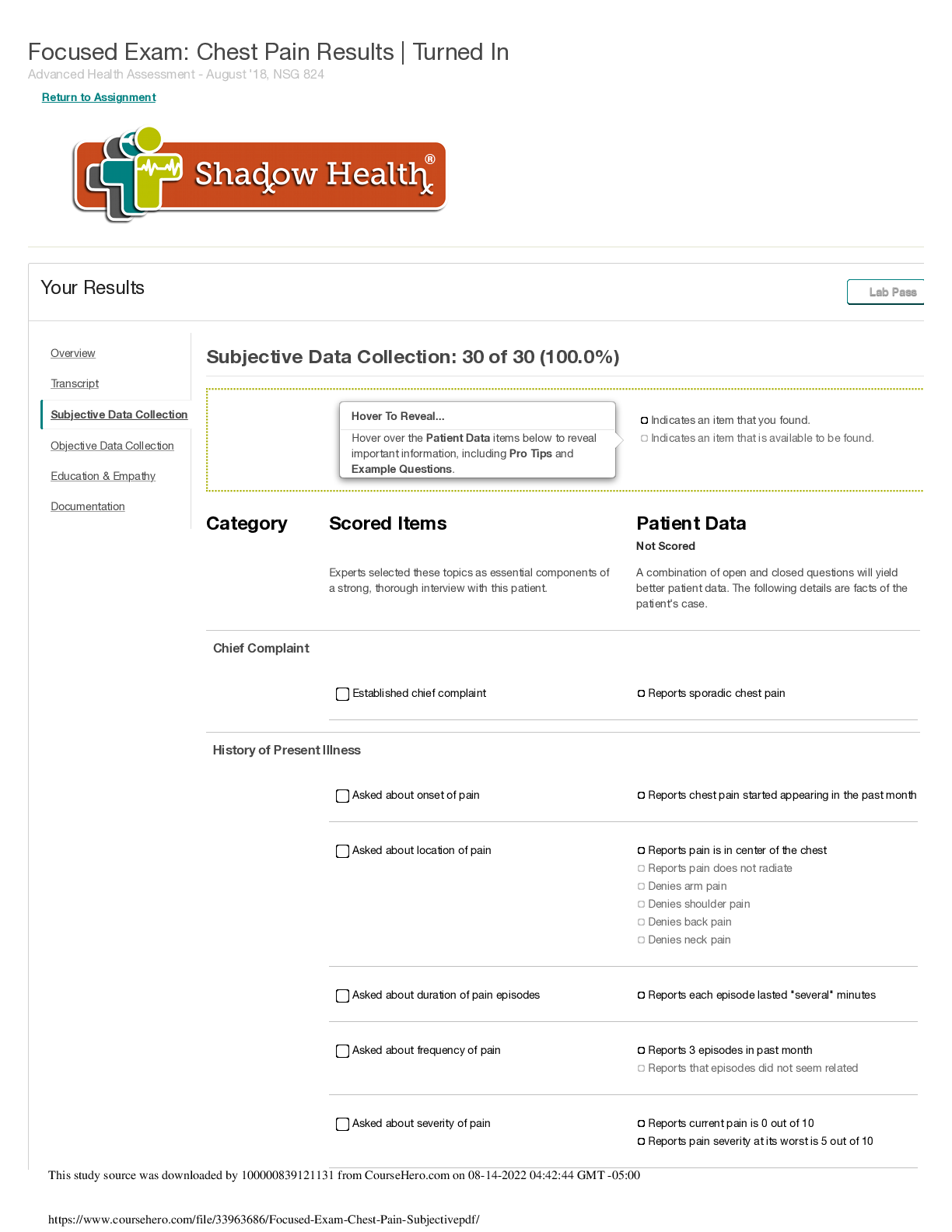
SHADOW HEALTH FOCUSED EXAMS BUNDLE. 100% VERIFIED.
SHADOW HEALTH FOCUSED EXAMS BUNDLE. 100% VERIFIED.
By A+ Solutions 2 years ago
$14.5
59
Reviews( 0 )
Document information
Connected school, study & course
About the document
Uploaded On
Oct 01, 2021
Number of pages
34
Written in
Additional information
This document has been written for:
Uploaded
Oct 01, 2021
Downloads
0
Views
103

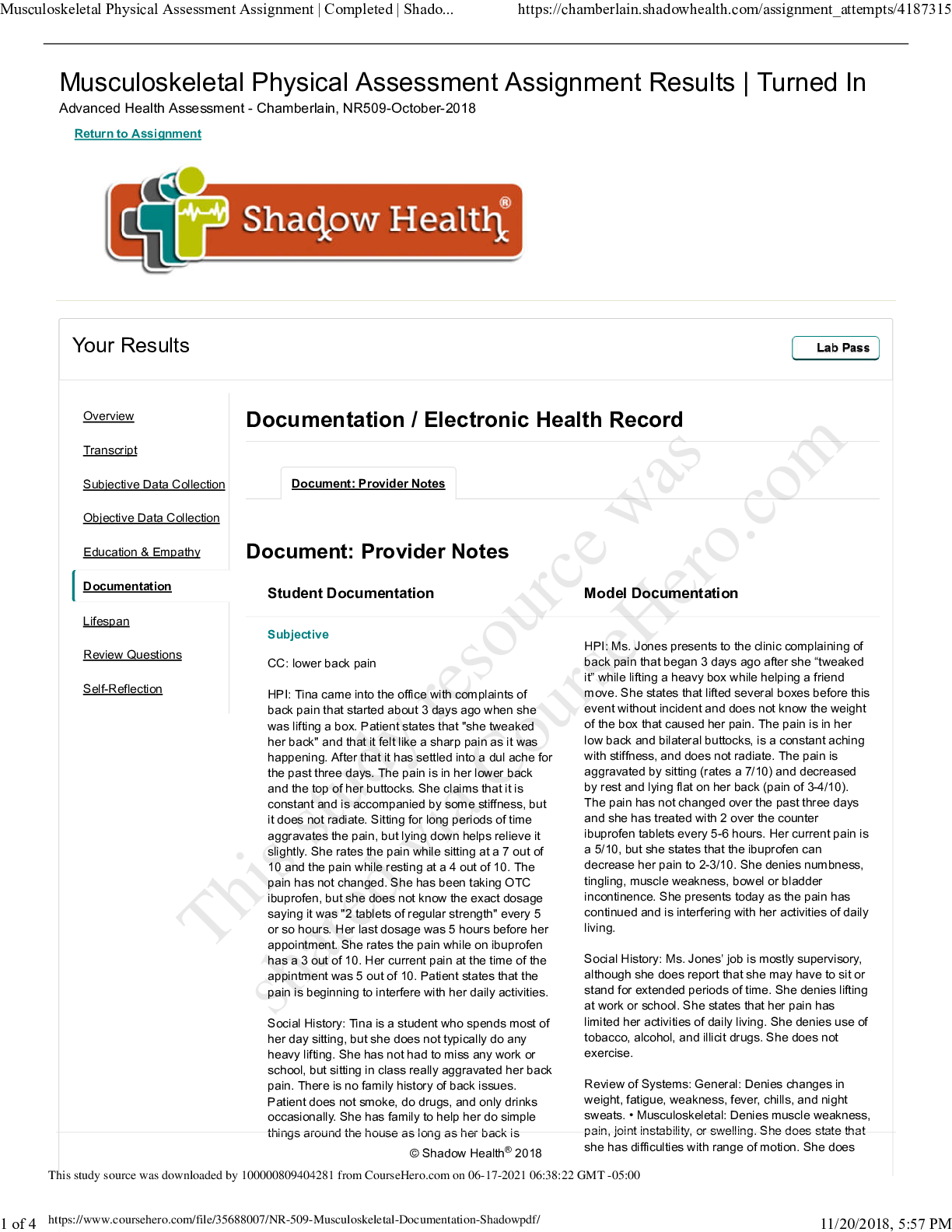
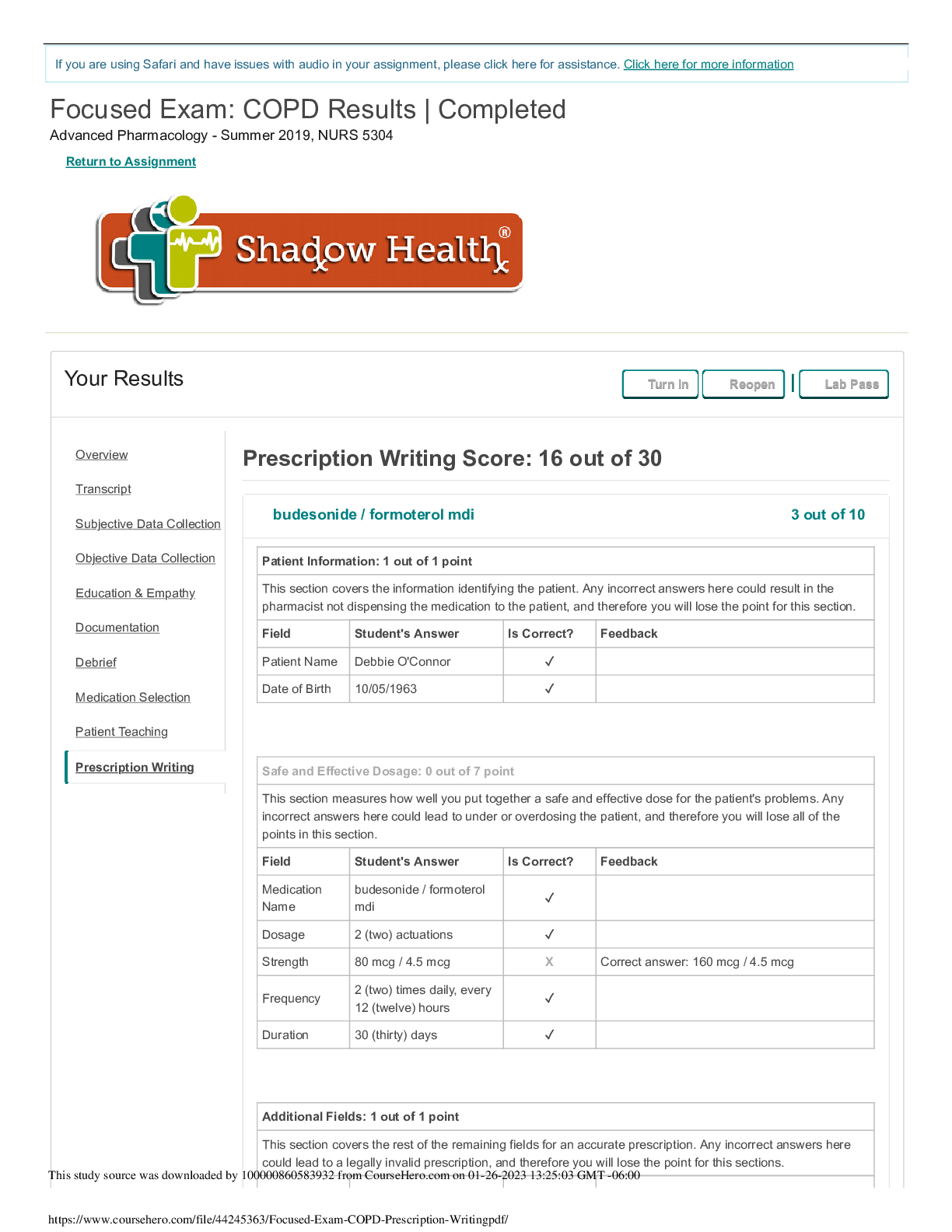
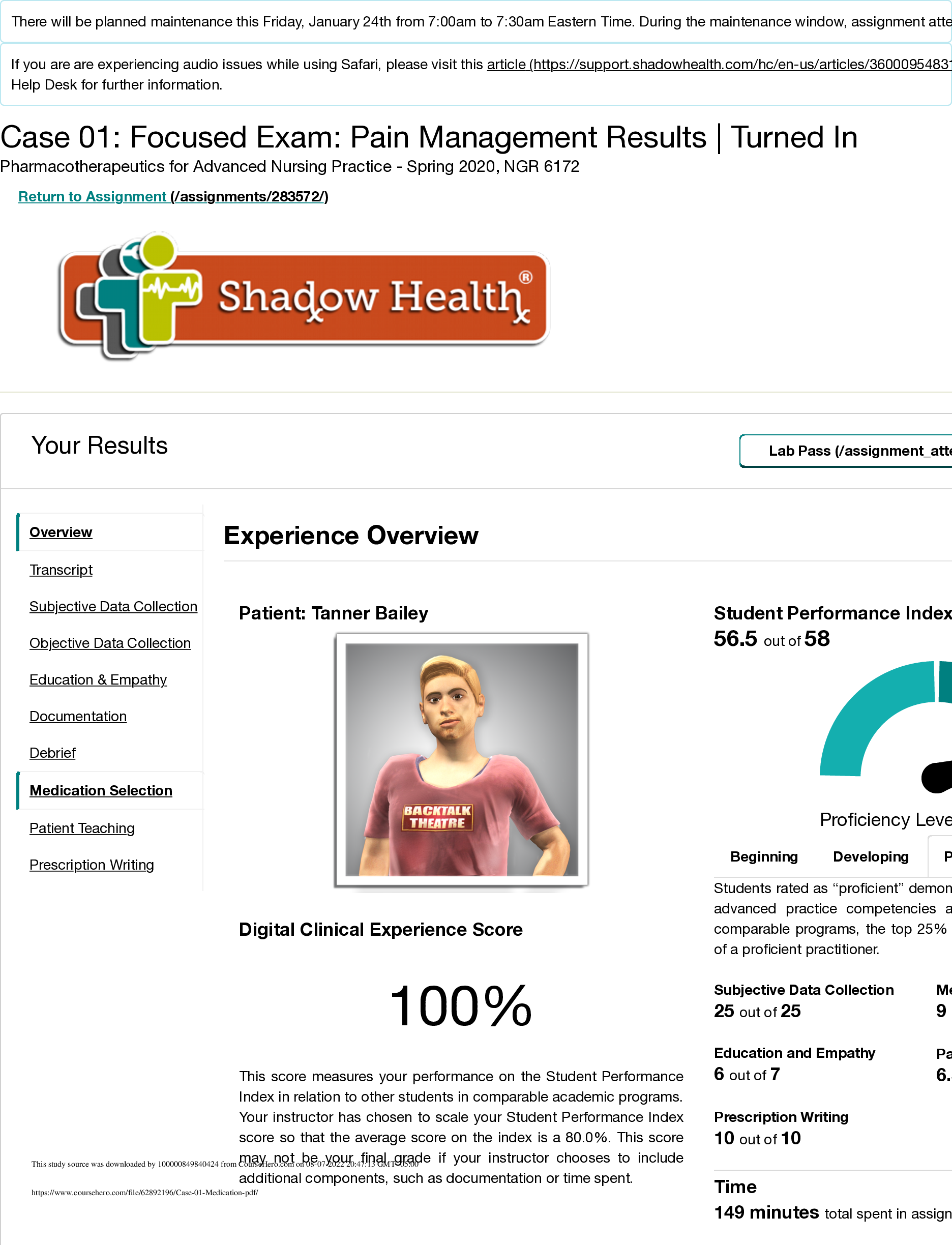
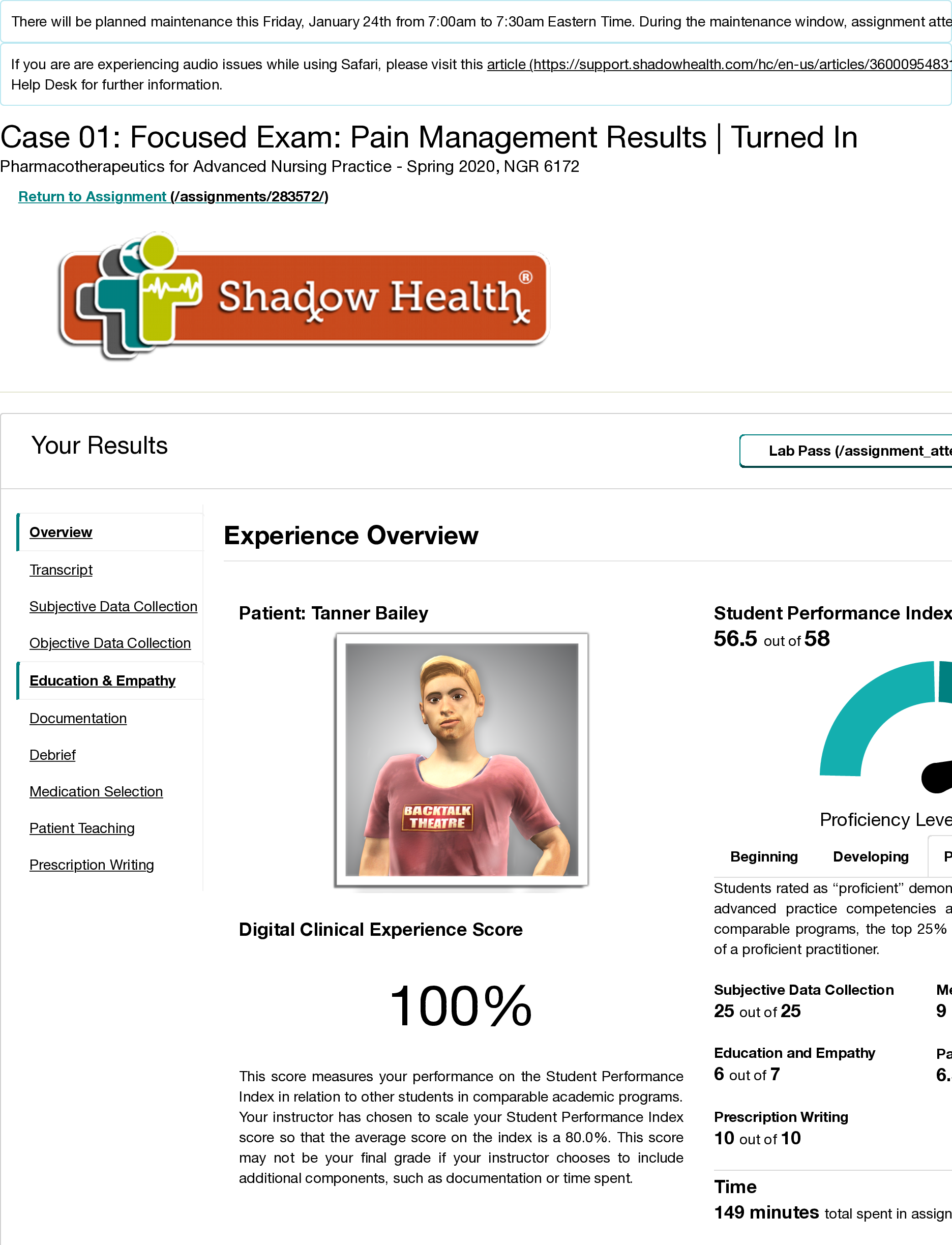
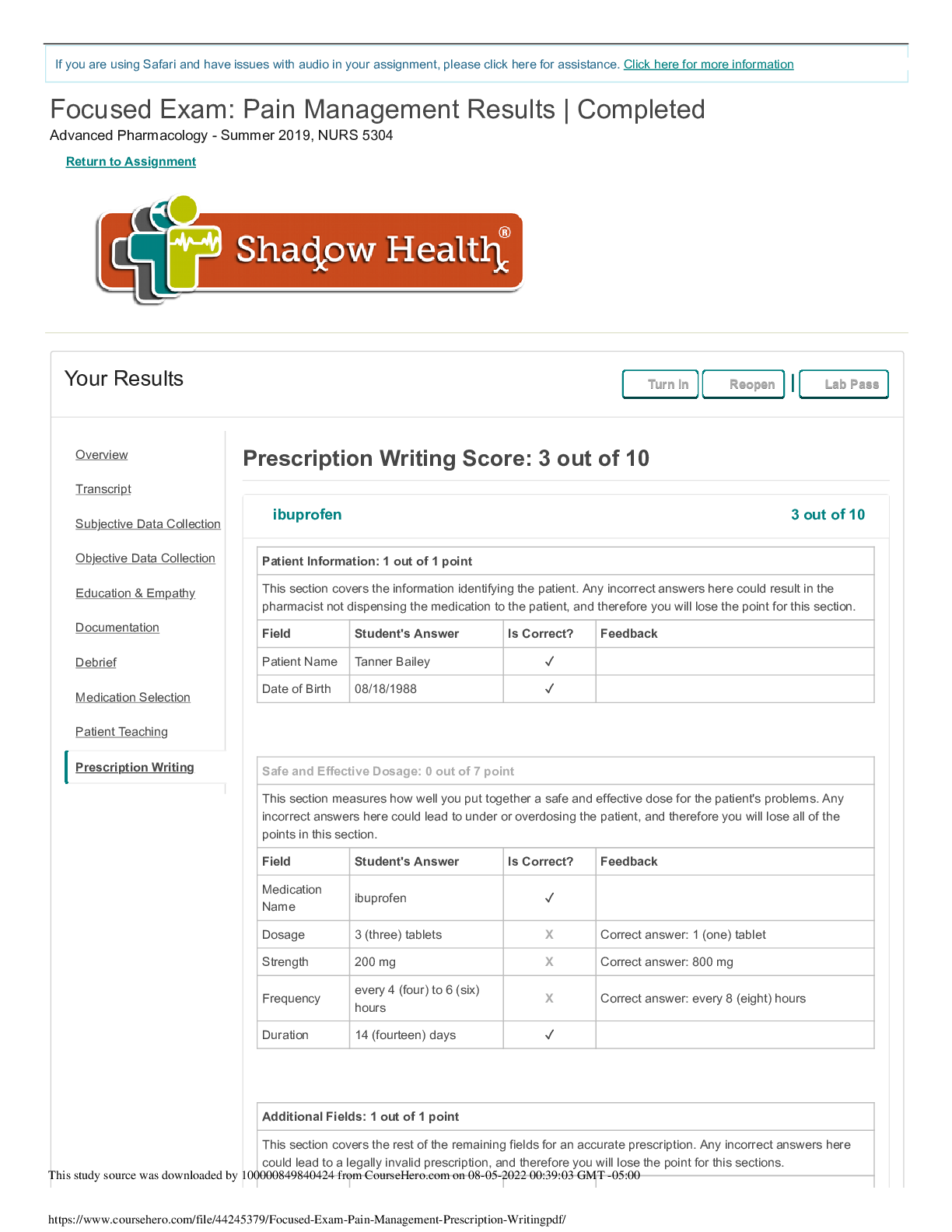
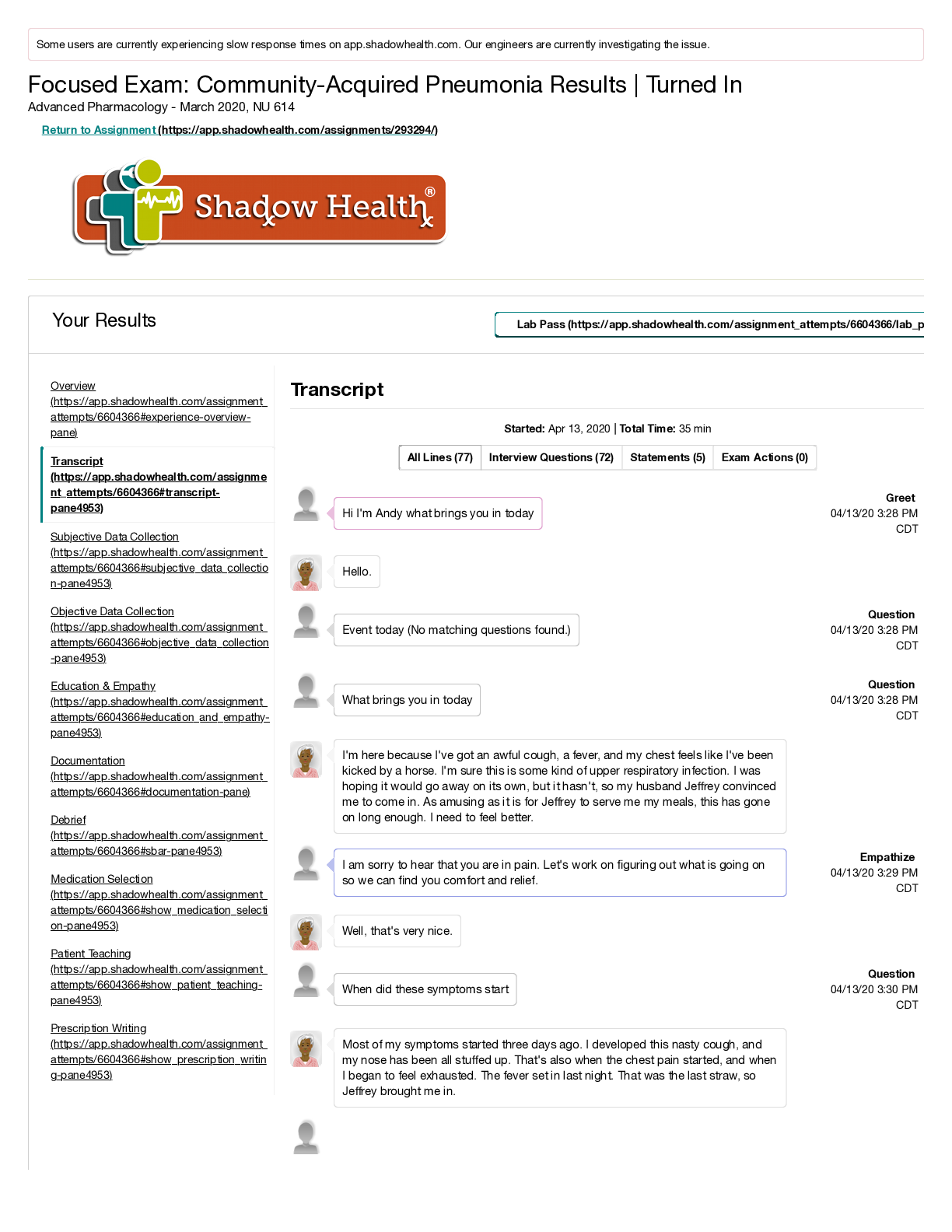
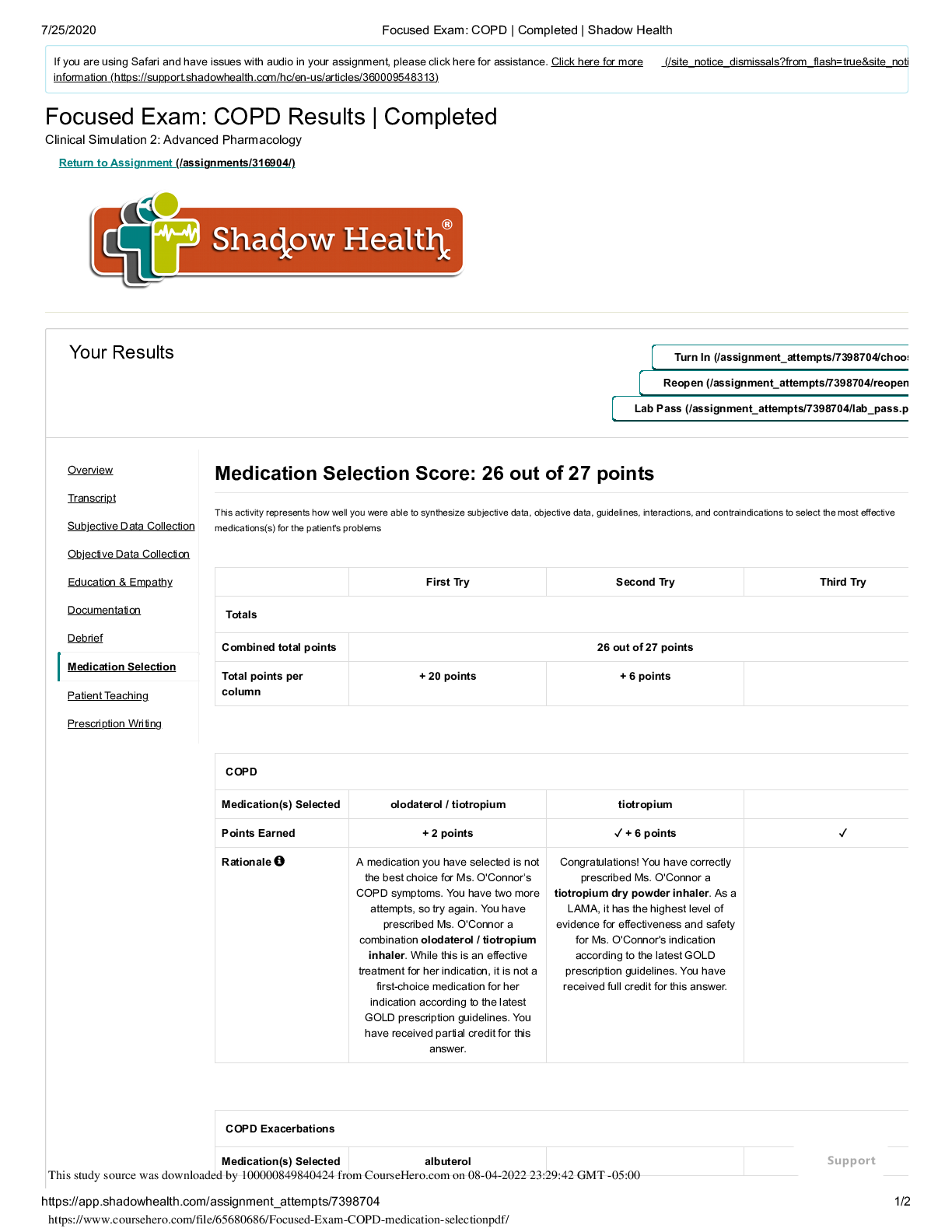
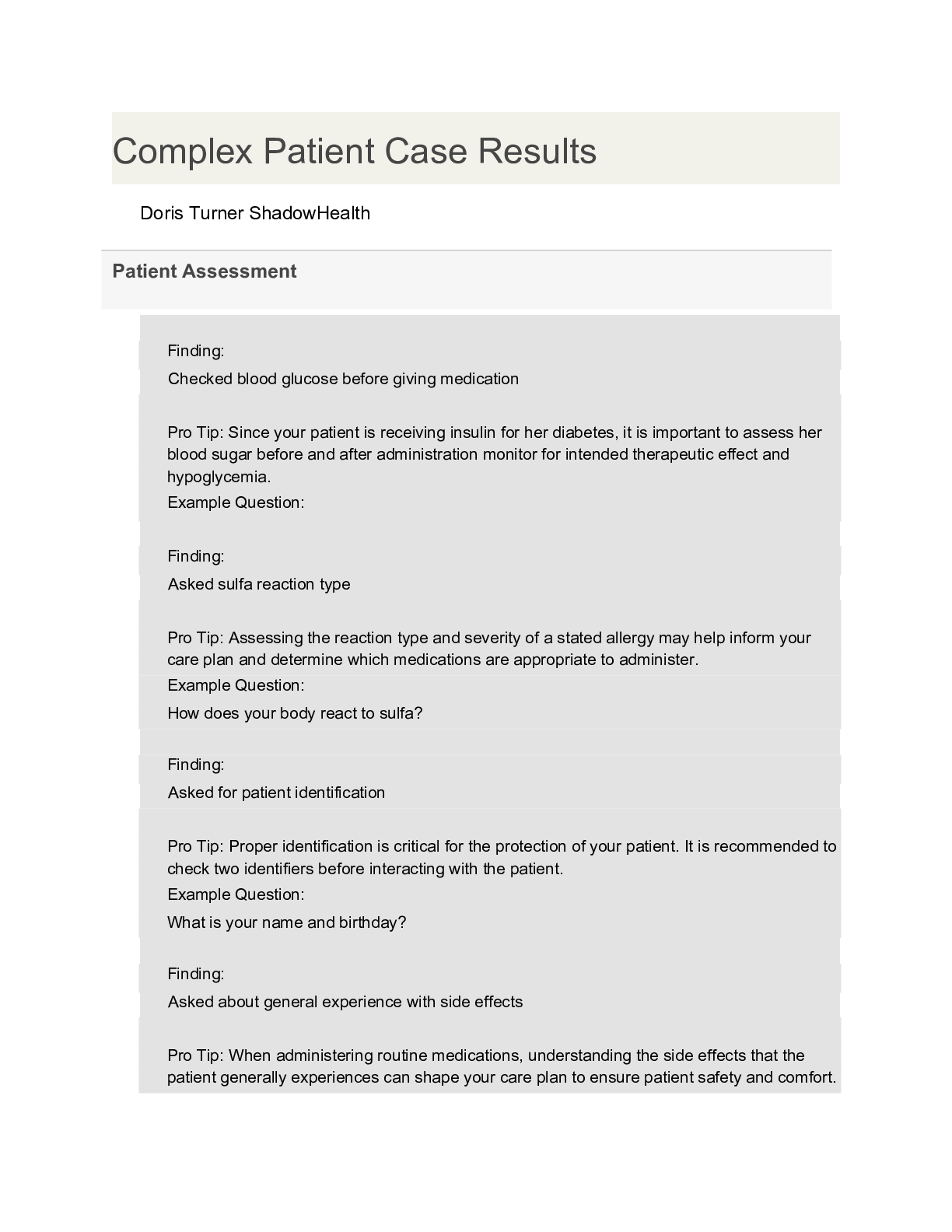

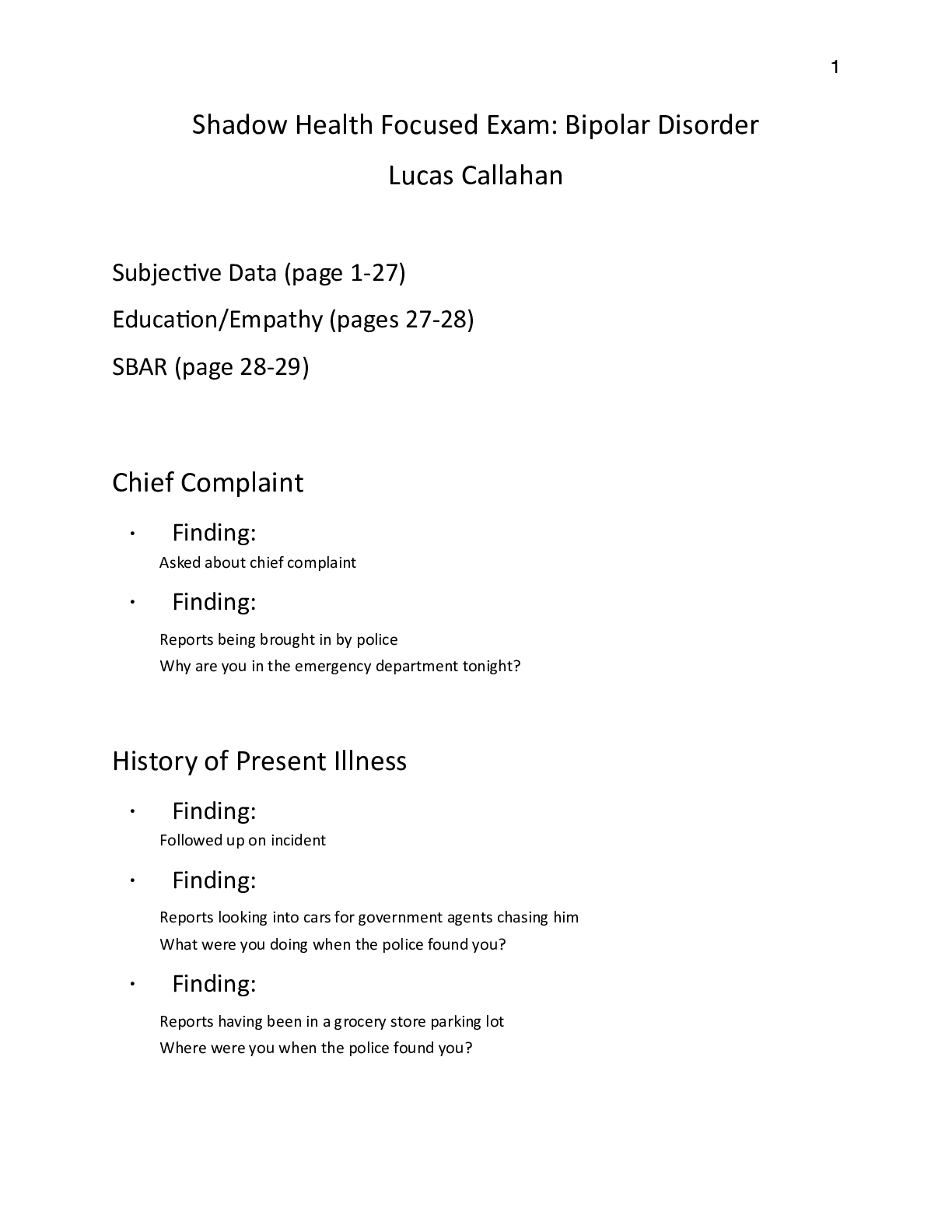
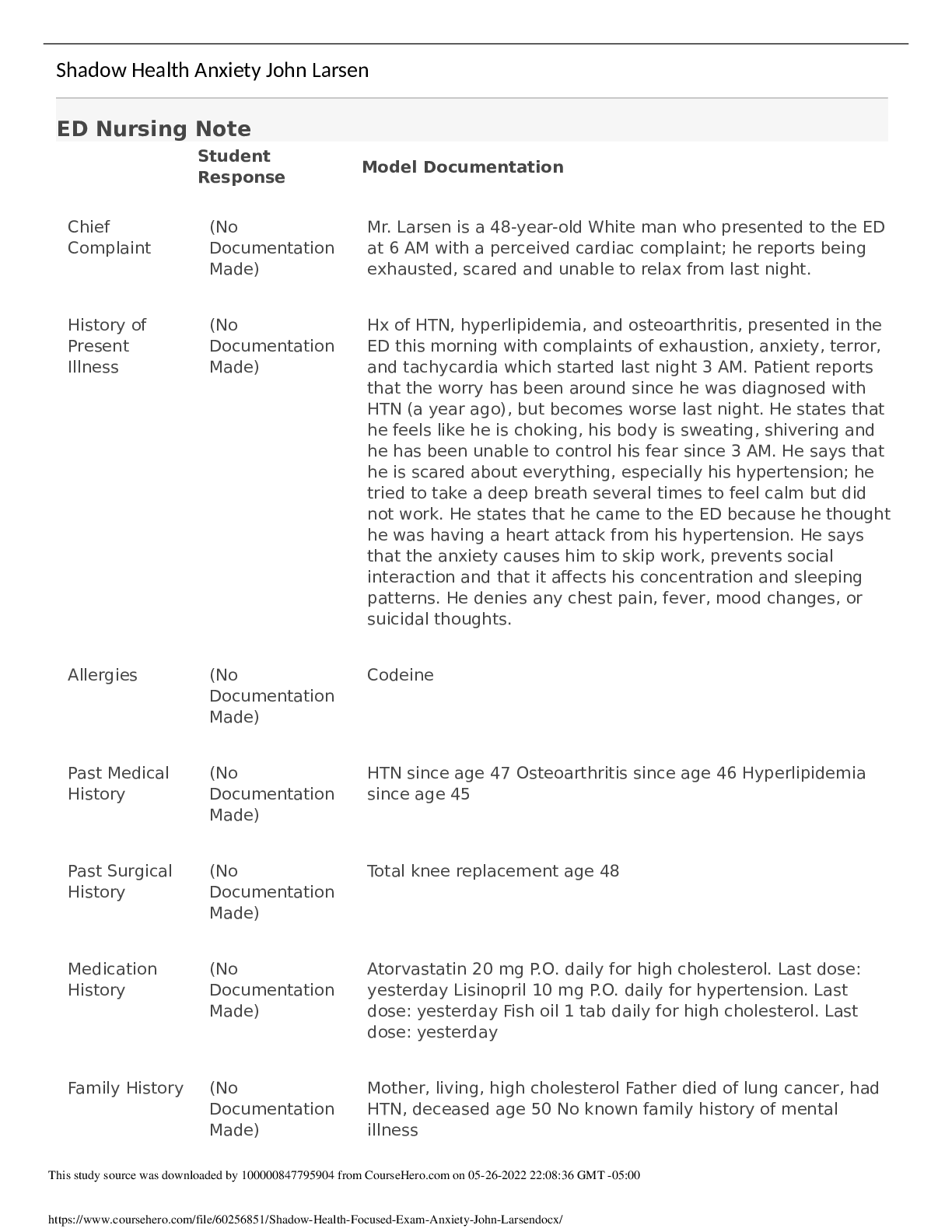
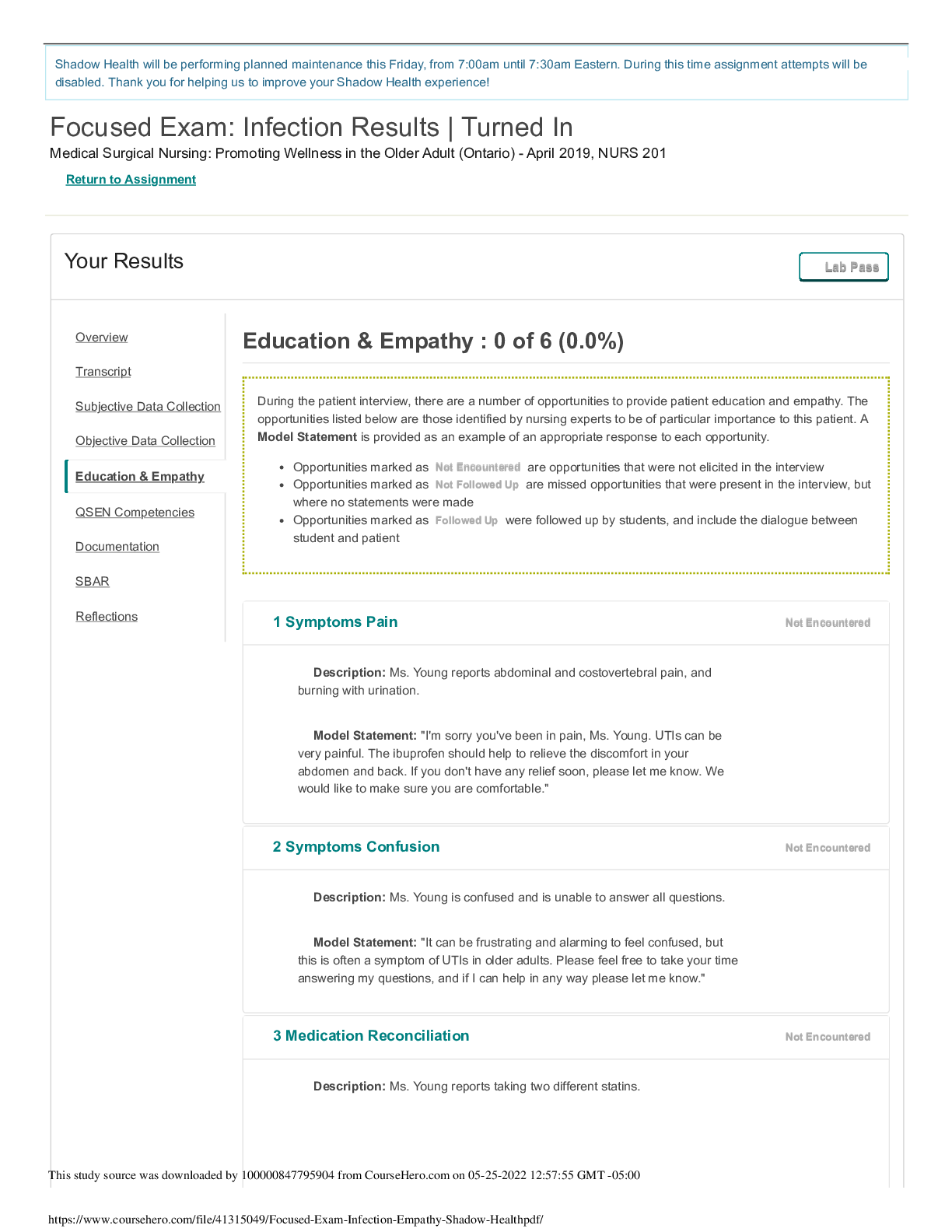
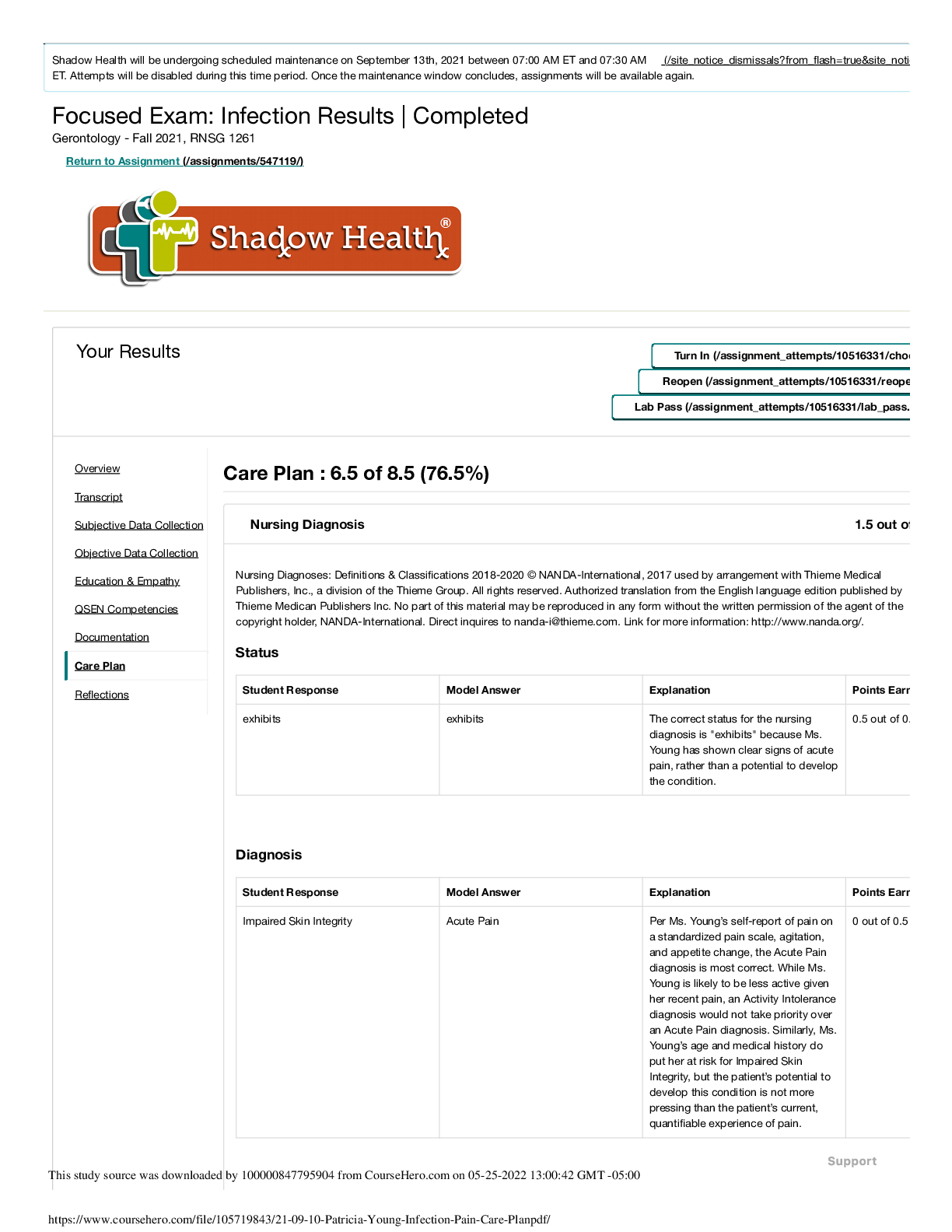
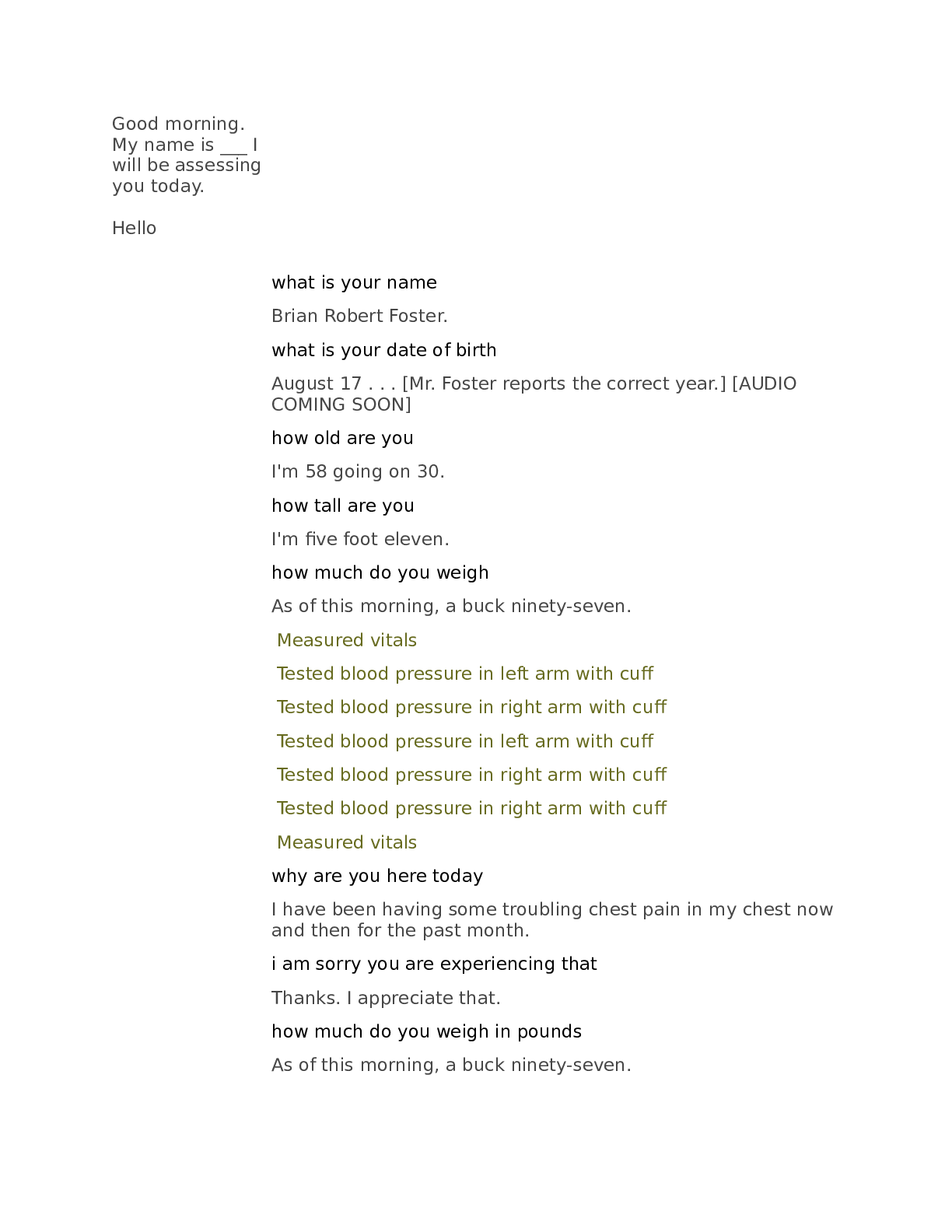
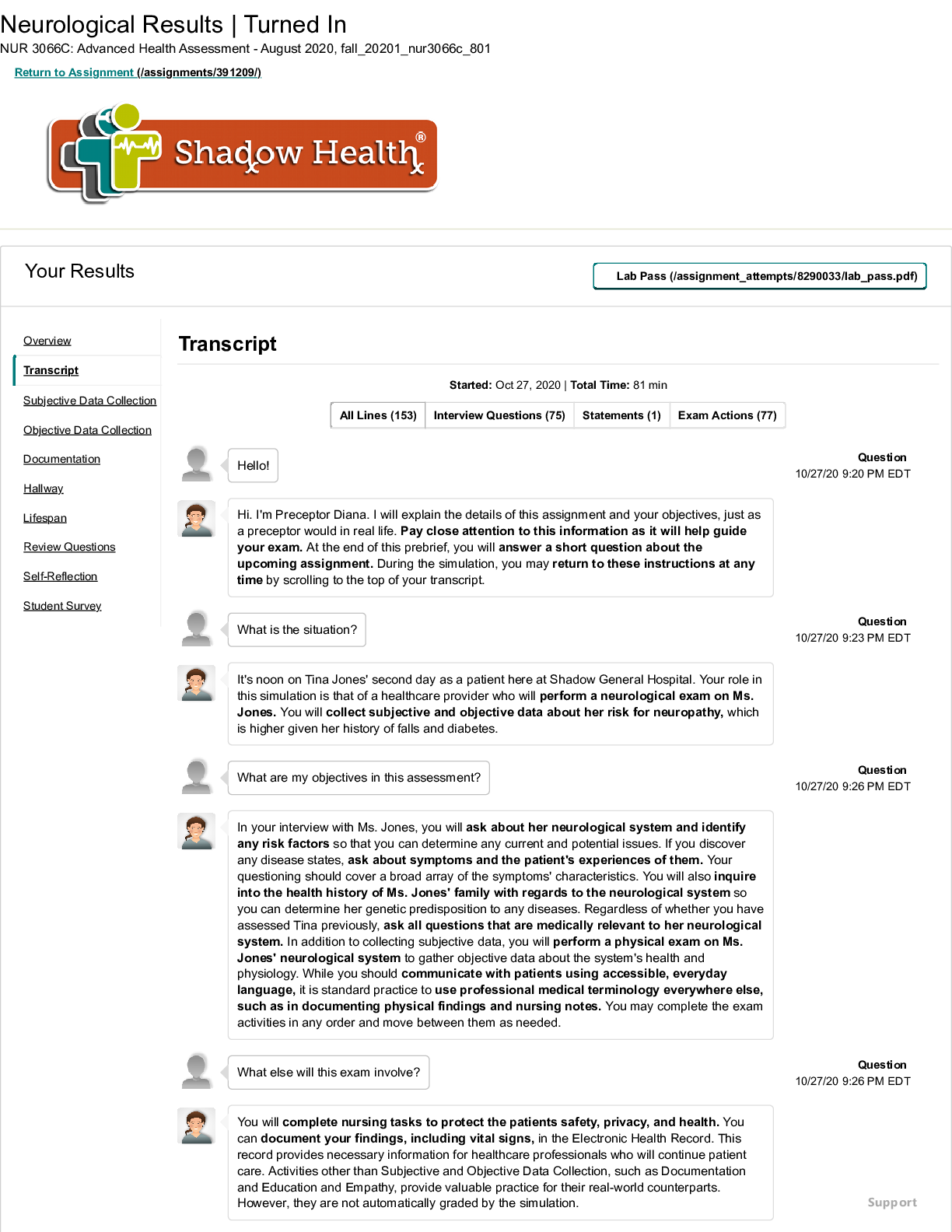
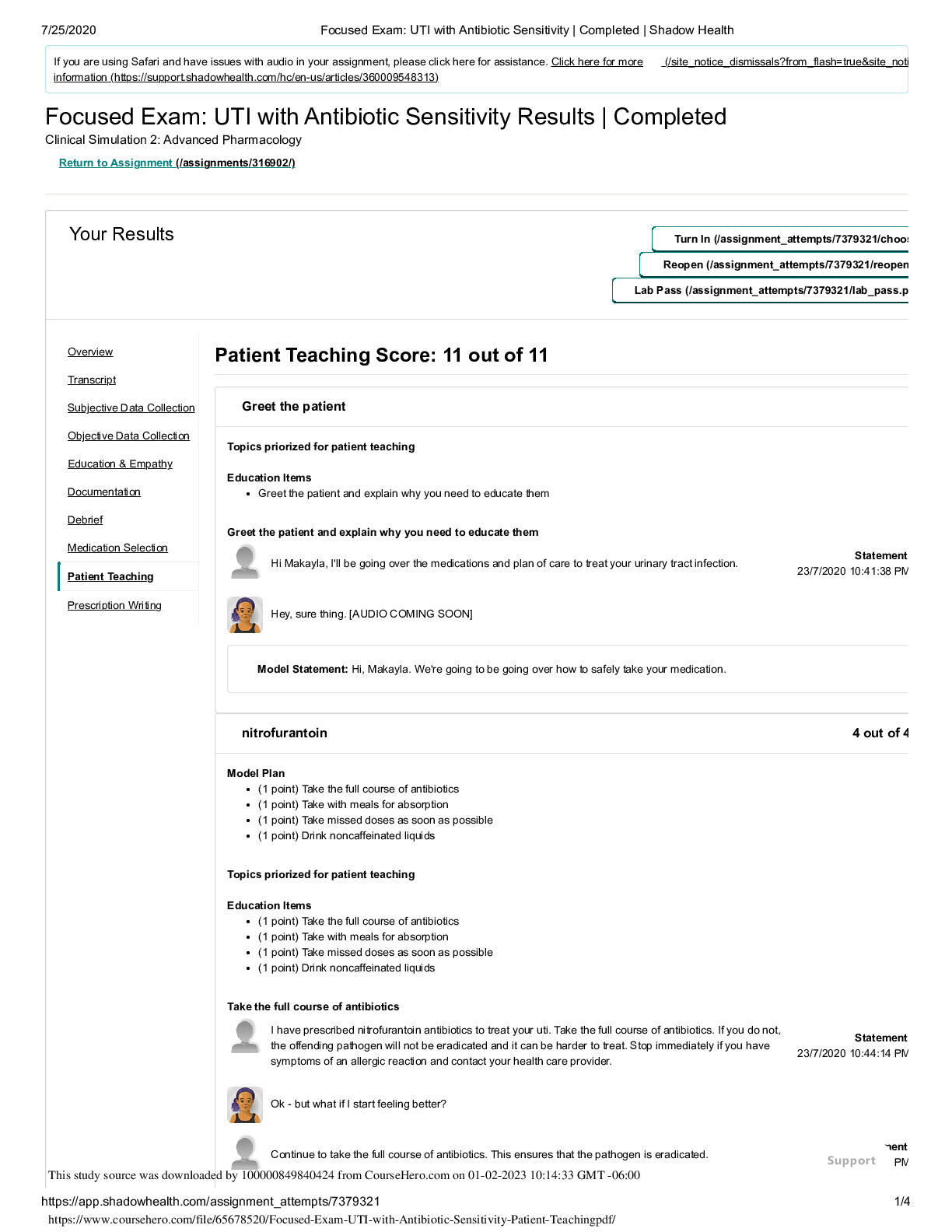
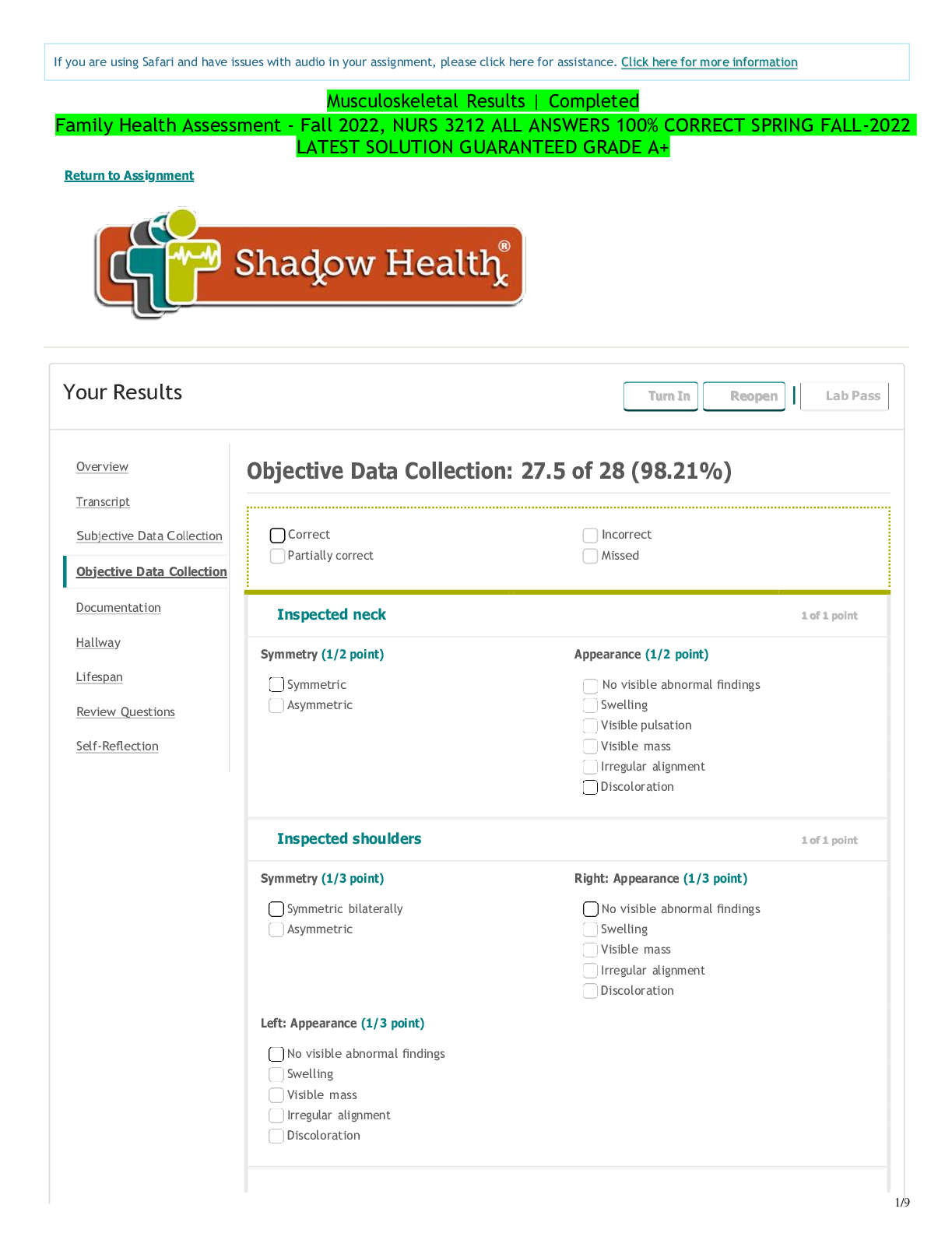
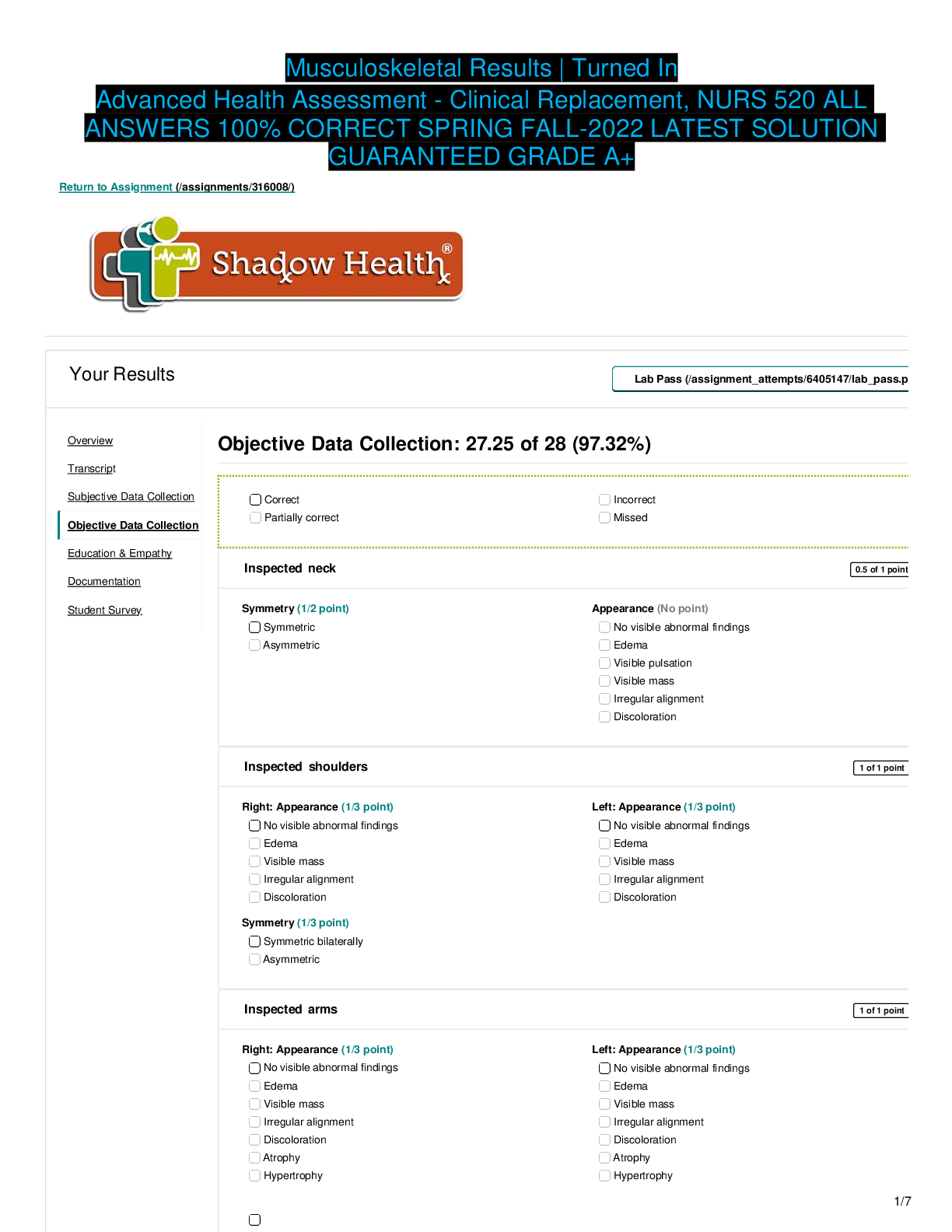
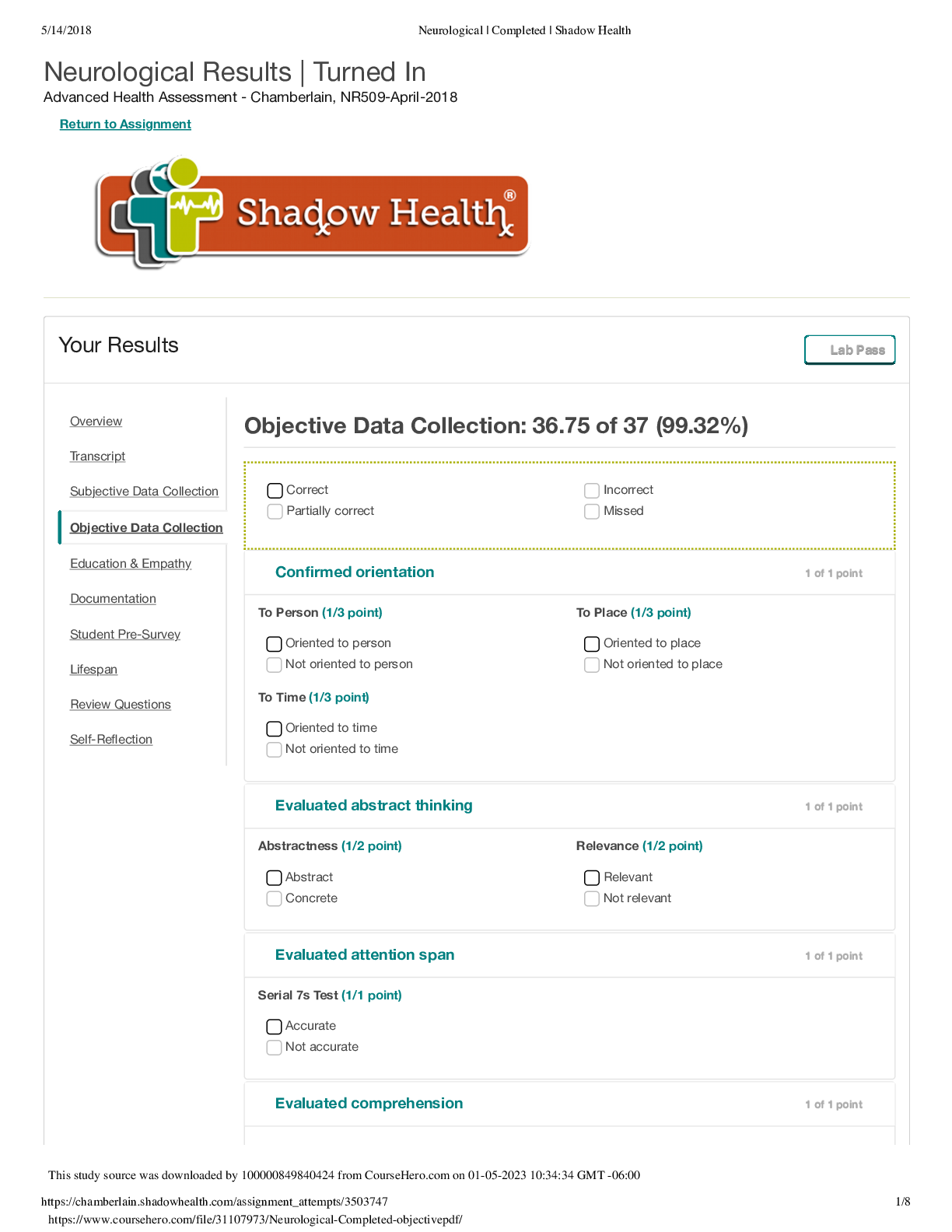
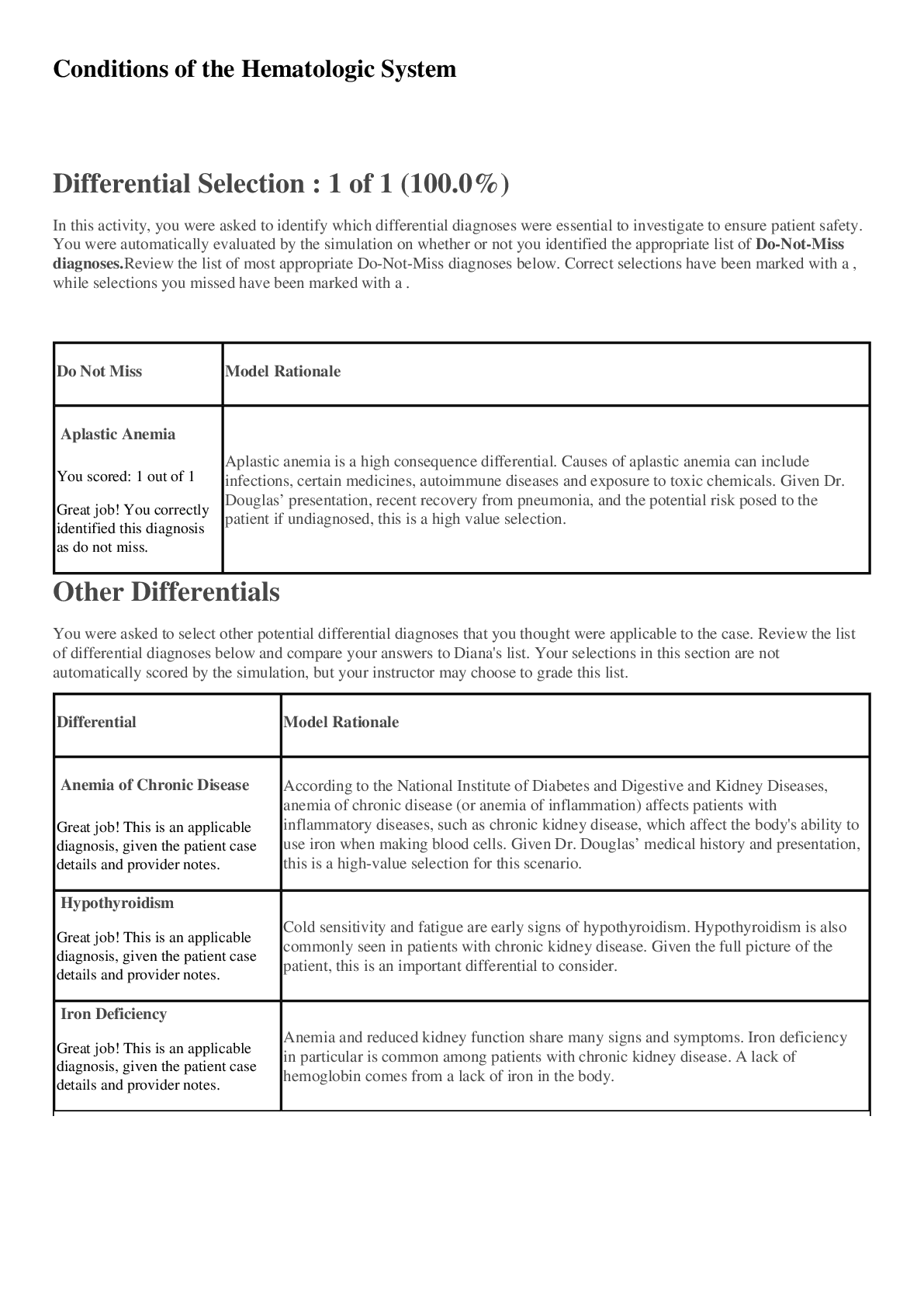
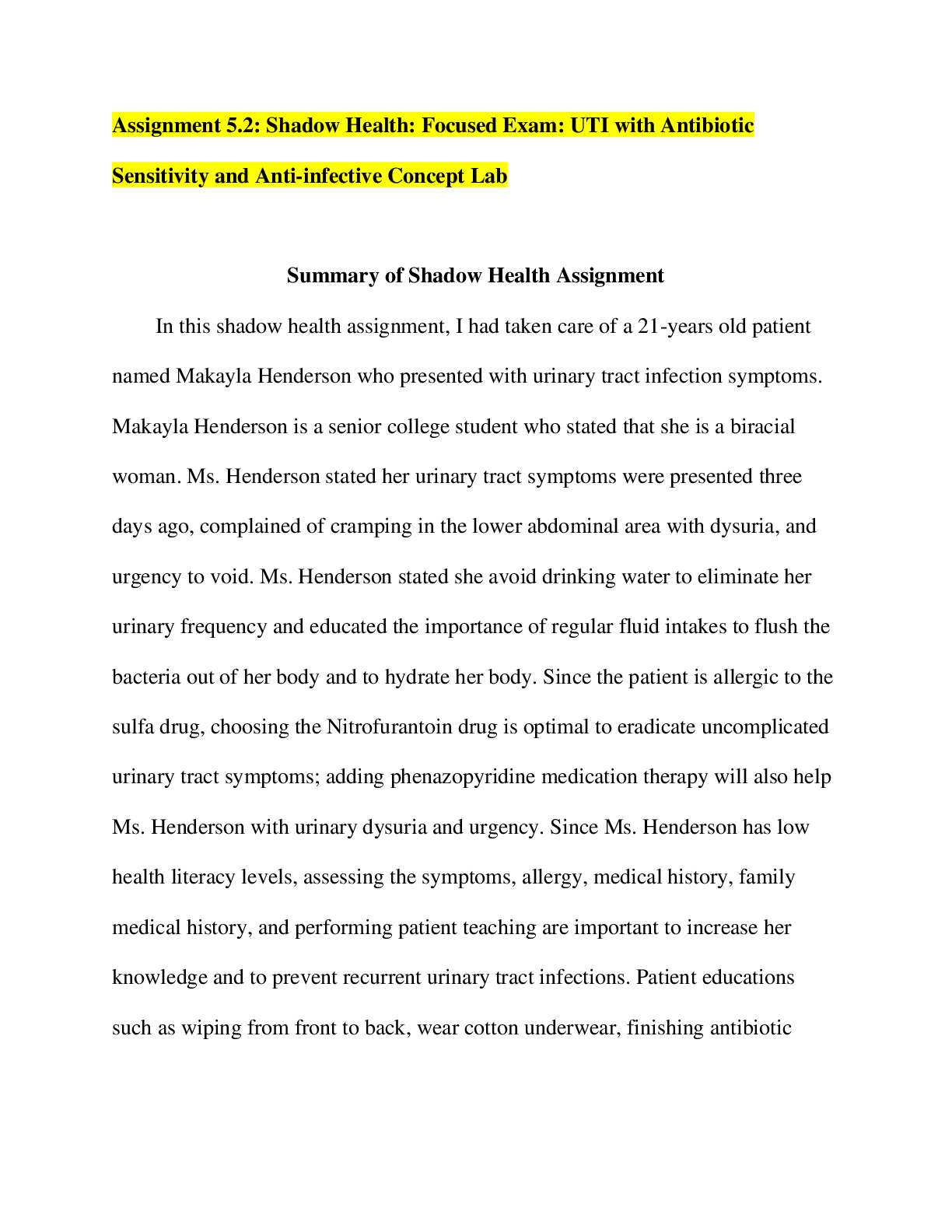
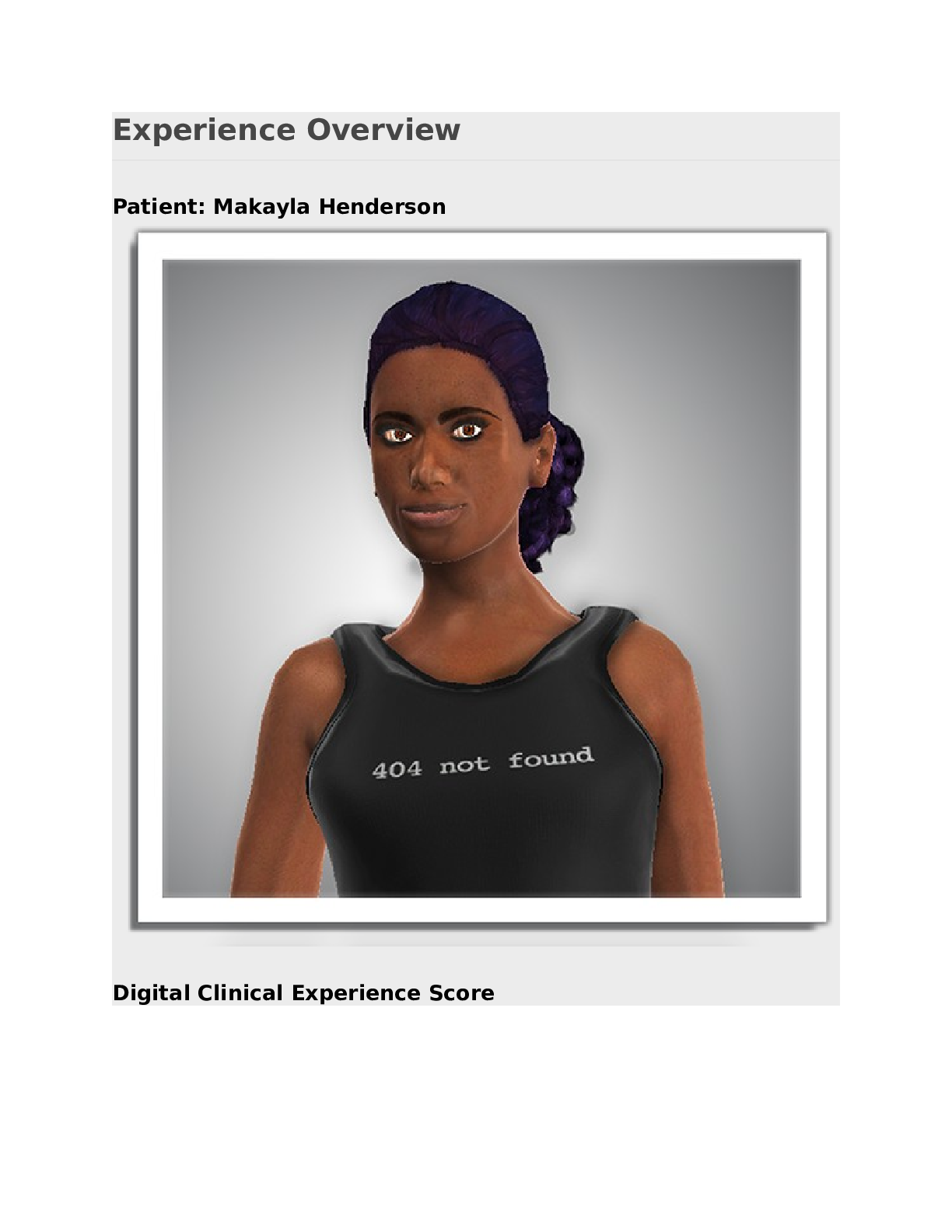
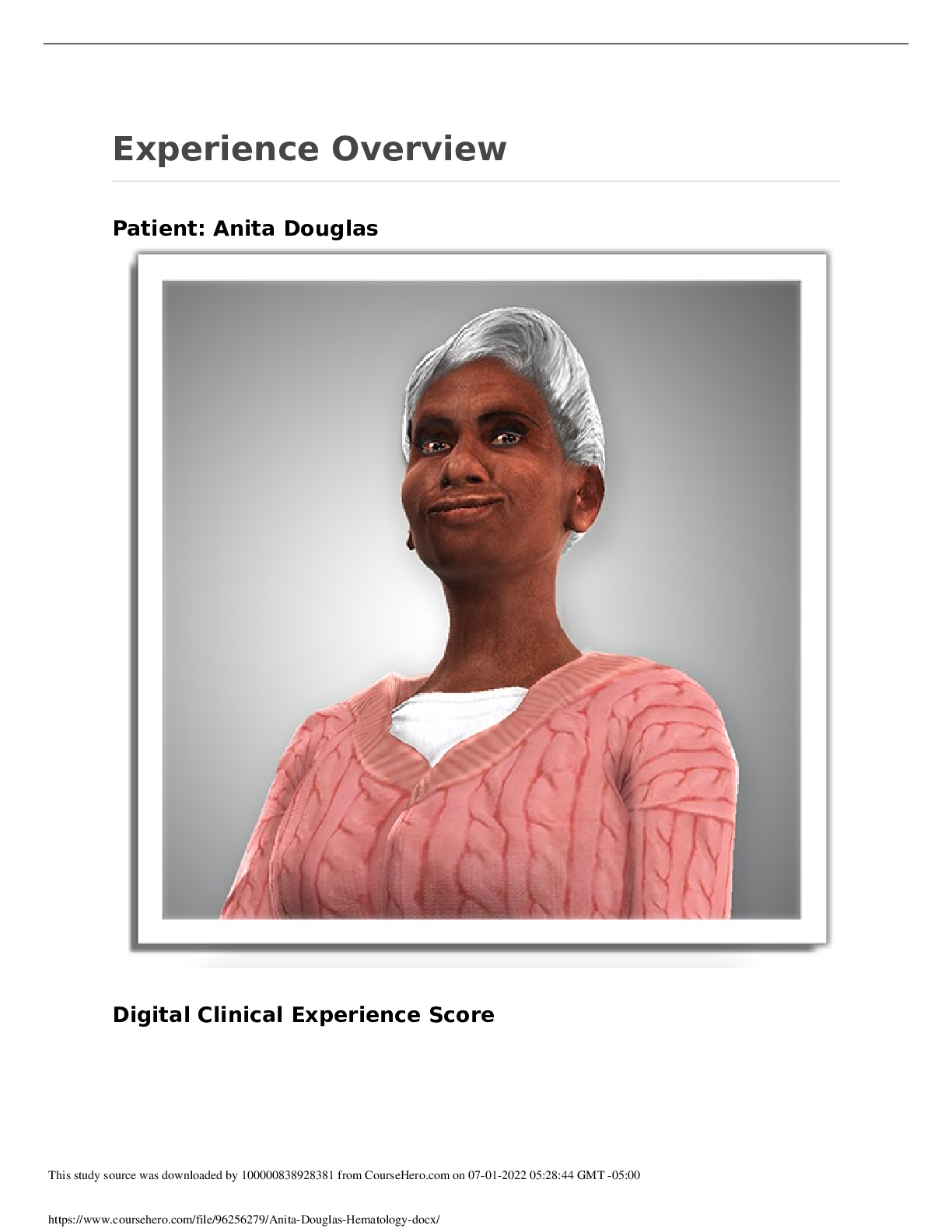
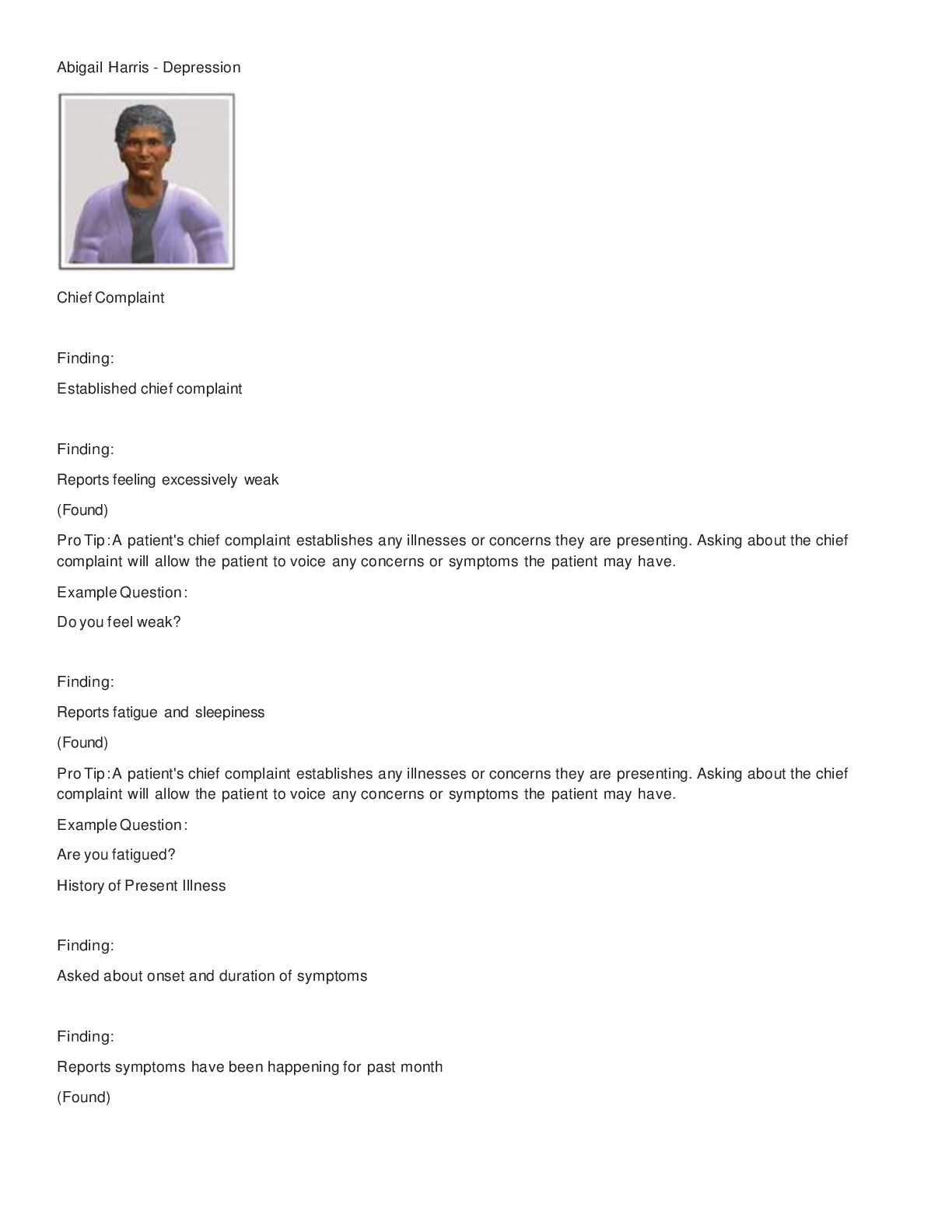
 Transcript.png)

